Safeguarding Service Users with Dementia in Care Home
VerifiedAdded on 2023/01/09
|35
|9510
|69
AI Summary
This study focuses on safeguarding service users with dementia in a care home, specifically Excel Care. It discusses the reasons for safeguarding, such as protecting their health and well-being, and explores effective ways to safeguard and protect them. The study also addresses the issues faced by care providers and recommends strategies to improve safeguarding and solve problems faced in dealing with people with dementia.
Contribute Materials
Your contribution can guide someone’s learning journey. Share your
documents today.

Improving the Health of
Others through Effective
Research
Others through Effective
Research
Secure Best Marks with AI Grader
Need help grading? Try our AI Grader for instant feedback on your assignments.
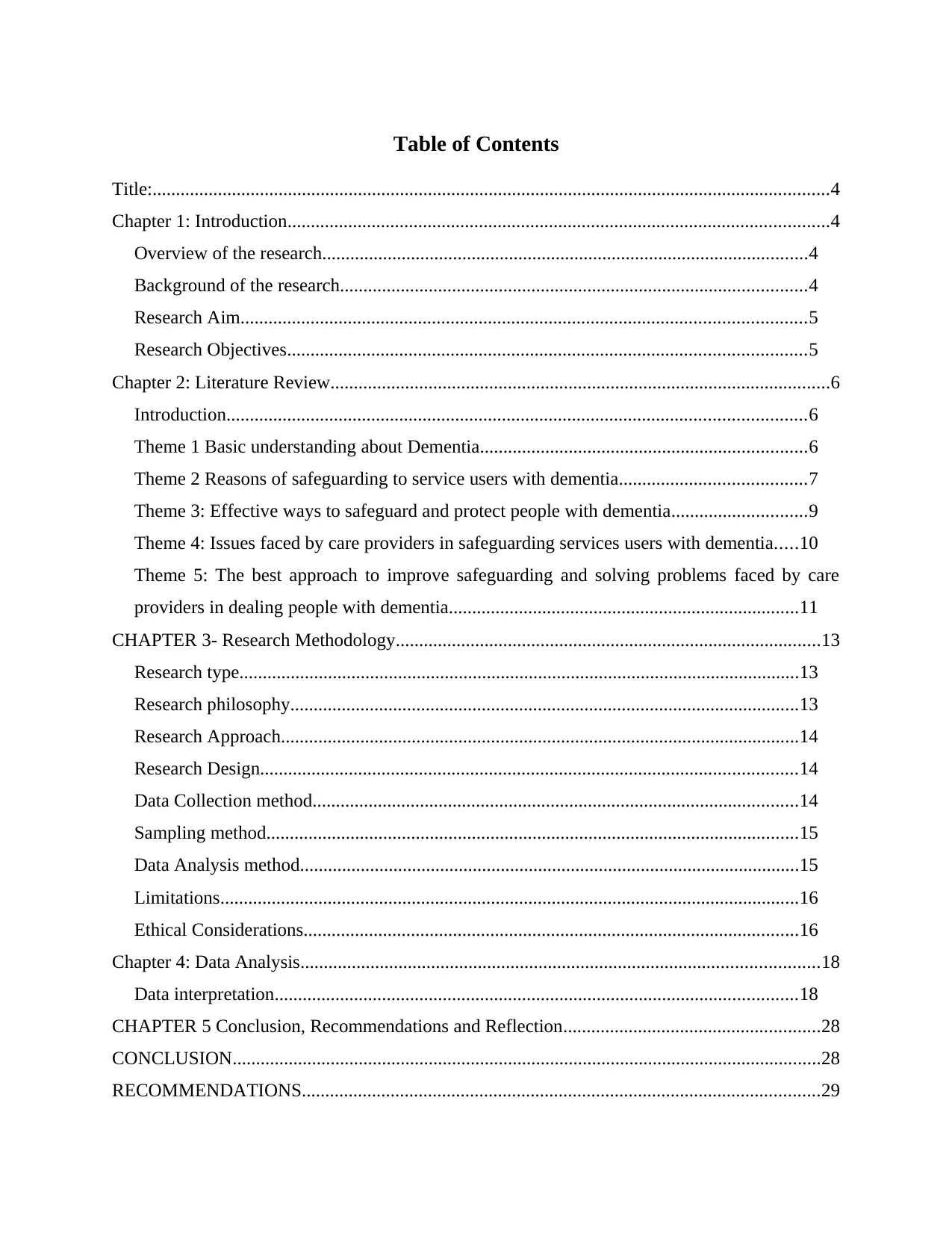
Table of Contents
Title:.................................................................................................................................................4
Chapter 1: Introduction....................................................................................................................4
Overview of the research........................................................................................................4
Background of the research....................................................................................................4
Research Aim.........................................................................................................................5
Research Objectives...............................................................................................................5
Chapter 2: Literature Review...........................................................................................................6
Introduction............................................................................................................................6
Theme 1 Basic understanding about Dementia......................................................................6
Theme 2 Reasons of safeguarding to service users with dementia........................................7
Theme 3: Effective ways to safeguard and protect people with dementia.............................9
Theme 4: Issues faced by care providers in safeguarding services users with dementia.....10
Theme 5: The best approach to improve safeguarding and solving problems faced by care
providers in dealing people with dementia...........................................................................11
CHAPTER 3- Research Methodology...........................................................................................13
Research type........................................................................................................................13
Research philosophy.............................................................................................................13
Research Approach...............................................................................................................14
Research Design...................................................................................................................14
Data Collection method........................................................................................................14
Sampling method..................................................................................................................15
Data Analysis method...........................................................................................................15
Limitations............................................................................................................................16
Ethical Considerations..........................................................................................................16
Chapter 4: Data Analysis...............................................................................................................18
Data interpretation................................................................................................................18
CHAPTER 5 Conclusion, Recommendations and Reflection.......................................................28
CONCLUSION..............................................................................................................................28
RECOMMENDATIONS...............................................................................................................29
Title:.................................................................................................................................................4
Chapter 1: Introduction....................................................................................................................4
Overview of the research........................................................................................................4
Background of the research....................................................................................................4
Research Aim.........................................................................................................................5
Research Objectives...............................................................................................................5
Chapter 2: Literature Review...........................................................................................................6
Introduction............................................................................................................................6
Theme 1 Basic understanding about Dementia......................................................................6
Theme 2 Reasons of safeguarding to service users with dementia........................................7
Theme 3: Effective ways to safeguard and protect people with dementia.............................9
Theme 4: Issues faced by care providers in safeguarding services users with dementia.....10
Theme 5: The best approach to improve safeguarding and solving problems faced by care
providers in dealing people with dementia...........................................................................11
CHAPTER 3- Research Methodology...........................................................................................13
Research type........................................................................................................................13
Research philosophy.............................................................................................................13
Research Approach...............................................................................................................14
Research Design...................................................................................................................14
Data Collection method........................................................................................................14
Sampling method..................................................................................................................15
Data Analysis method...........................................................................................................15
Limitations............................................................................................................................16
Ethical Considerations..........................................................................................................16
Chapter 4: Data Analysis...............................................................................................................18
Data interpretation................................................................................................................18
CHAPTER 5 Conclusion, Recommendations and Reflection.......................................................28
CONCLUSION..............................................................................................................................28
RECOMMENDATIONS...............................................................................................................29

REFLECTION...............................................................................................................................30
References......................................................................................................................................31
Appendix........................................................................................................................................33
References......................................................................................................................................31
Appendix........................................................................................................................................33
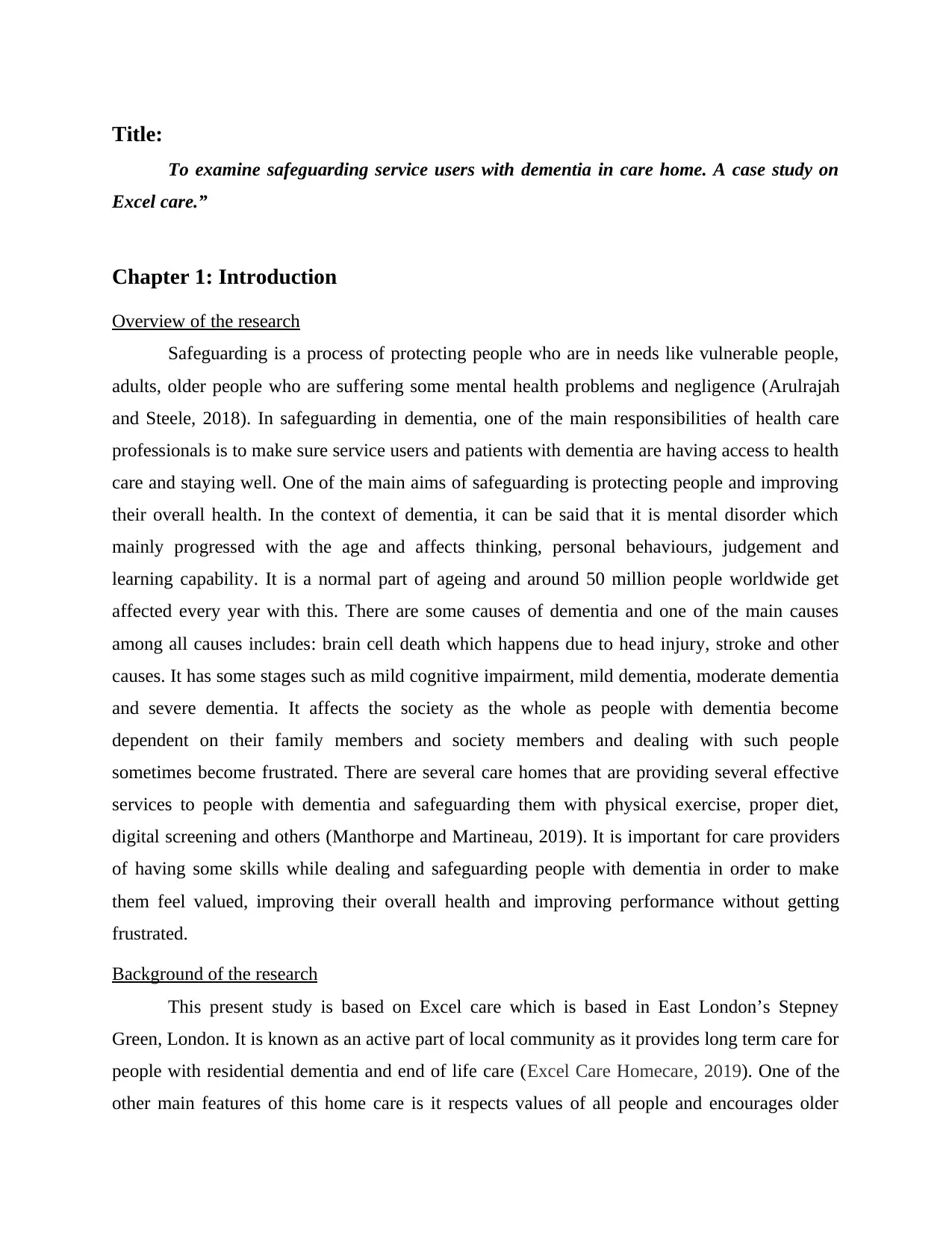
Title:
To examine safeguarding service users with dementia in care home. A case study on
Excel care.”
Chapter 1: Introduction
Overview of the research
Safeguarding is a process of protecting people who are in needs like vulnerable people,
adults, older people who are suffering some mental health problems and negligence (Arulrajah
and Steele, 2018). In safeguarding in dementia, one of the main responsibilities of health care
professionals is to make sure service users and patients with dementia are having access to health
care and staying well. One of the main aims of safeguarding is protecting people and improving
their overall health. In the context of dementia, it can be said that it is mental disorder which
mainly progressed with the age and affects thinking, personal behaviours, judgement and
learning capability. It is a normal part of ageing and around 50 million people worldwide get
affected every year with this. There are some causes of dementia and one of the main causes
among all causes includes: brain cell death which happens due to head injury, stroke and other
causes. It has some stages such as mild cognitive impairment, mild dementia, moderate dementia
and severe dementia. It affects the society as the whole as people with dementia become
dependent on their family members and society members and dealing with such people
sometimes become frustrated. There are several care homes that are providing several effective
services to people with dementia and safeguarding them with physical exercise, proper diet,
digital screening and others (Manthorpe and Martineau, 2019). It is important for care providers
of having some skills while dealing and safeguarding people with dementia in order to make
them feel valued, improving their overall health and improving performance without getting
frustrated.
Background of the research
This present study is based on Excel care which is based in East London’s Stepney
Green, London. It is known as an active part of local community as it provides long term care for
people with residential dementia and end of life care (Excel Care Homecare, 2019). One of the
other main features of this home care is it respects values of all people and encourages older
To examine safeguarding service users with dementia in care home. A case study on
Excel care.”
Chapter 1: Introduction
Overview of the research
Safeguarding is a process of protecting people who are in needs like vulnerable people,
adults, older people who are suffering some mental health problems and negligence (Arulrajah
and Steele, 2018). In safeguarding in dementia, one of the main responsibilities of health care
professionals is to make sure service users and patients with dementia are having access to health
care and staying well. One of the main aims of safeguarding is protecting people and improving
their overall health. In the context of dementia, it can be said that it is mental disorder which
mainly progressed with the age and affects thinking, personal behaviours, judgement and
learning capability. It is a normal part of ageing and around 50 million people worldwide get
affected every year with this. There are some causes of dementia and one of the main causes
among all causes includes: brain cell death which happens due to head injury, stroke and other
causes. It has some stages such as mild cognitive impairment, mild dementia, moderate dementia
and severe dementia. It affects the society as the whole as people with dementia become
dependent on their family members and society members and dealing with such people
sometimes become frustrated. There are several care homes that are providing several effective
services to people with dementia and safeguarding them with physical exercise, proper diet,
digital screening and others (Manthorpe and Martineau, 2019). It is important for care providers
of having some skills while dealing and safeguarding people with dementia in order to make
them feel valued, improving their overall health and improving performance without getting
frustrated.
Background of the research
This present study is based on Excel care which is based in East London’s Stepney
Green, London. It is known as an active part of local community as it provides long term care for
people with residential dementia and end of life care (Excel Care Homecare, 2019). One of the
other main features of this home care is it respects values of all people and encourages older
Secure Best Marks with AI Grader
Need help grading? Try our AI Grader for instant feedback on your assignments.
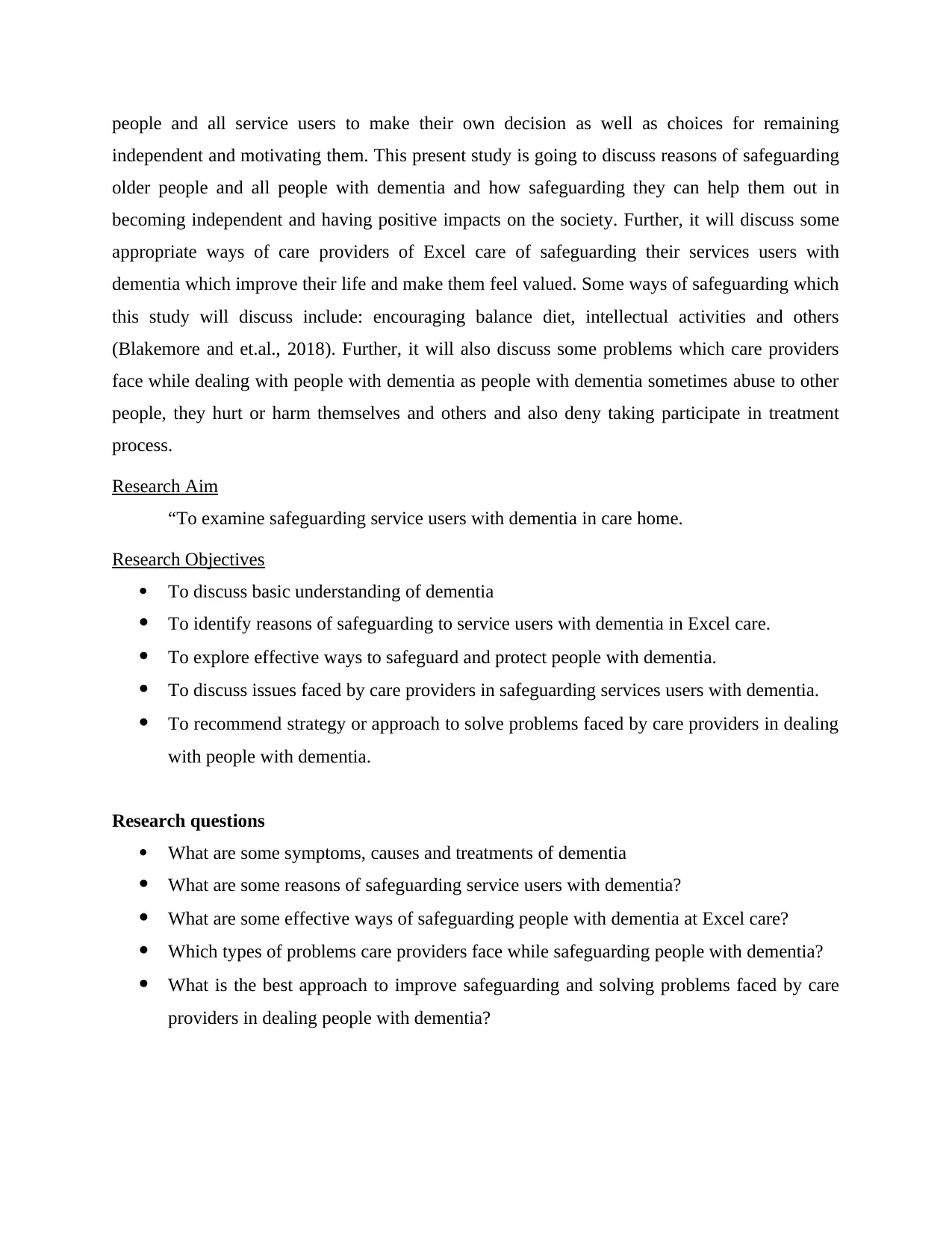
people and all service users to make their own decision as well as choices for remaining
independent and motivating them. This present study is going to discuss reasons of safeguarding
older people and all people with dementia and how safeguarding they can help them out in
becoming independent and having positive impacts on the society. Further, it will discuss some
appropriate ways of care providers of Excel care of safeguarding their services users with
dementia which improve their life and make them feel valued. Some ways of safeguarding which
this study will discuss include: encouraging balance diet, intellectual activities and others
(Blakemore and et.al., 2018). Further, it will also discuss some problems which care providers
face while dealing with people with dementia as people with dementia sometimes abuse to other
people, they hurt or harm themselves and others and also deny taking participate in treatment
process.
Research Aim
“To examine safeguarding service users with dementia in care home.
Research Objectives
To discuss basic understanding of dementia
To identify reasons of safeguarding to service users with dementia in Excel care.
To explore effective ways to safeguard and protect people with dementia.
To discuss issues faced by care providers in safeguarding services users with dementia.
To recommend strategy or approach to solve problems faced by care providers in dealing
with people with dementia.
Research questions
What are some symptoms, causes and treatments of dementia
What are some reasons of safeguarding service users with dementia?
What are some effective ways of safeguarding people with dementia at Excel care?
Which types of problems care providers face while safeguarding people with dementia?
What is the best approach to improve safeguarding and solving problems faced by care
providers in dealing people with dementia?
independent and motivating them. This present study is going to discuss reasons of safeguarding
older people and all people with dementia and how safeguarding they can help them out in
becoming independent and having positive impacts on the society. Further, it will discuss some
appropriate ways of care providers of Excel care of safeguarding their services users with
dementia which improve their life and make them feel valued. Some ways of safeguarding which
this study will discuss include: encouraging balance diet, intellectual activities and others
(Blakemore and et.al., 2018). Further, it will also discuss some problems which care providers
face while dealing with people with dementia as people with dementia sometimes abuse to other
people, they hurt or harm themselves and others and also deny taking participate in treatment
process.
Research Aim
“To examine safeguarding service users with dementia in care home.
Research Objectives
To discuss basic understanding of dementia
To identify reasons of safeguarding to service users with dementia in Excel care.
To explore effective ways to safeguard and protect people with dementia.
To discuss issues faced by care providers in safeguarding services users with dementia.
To recommend strategy or approach to solve problems faced by care providers in dealing
with people with dementia.
Research questions
What are some symptoms, causes and treatments of dementia
What are some reasons of safeguarding service users with dementia?
What are some effective ways of safeguarding people with dementia at Excel care?
Which types of problems care providers face while safeguarding people with dementia?
What is the best approach to improve safeguarding and solving problems faced by care
providers in dealing people with dementia?
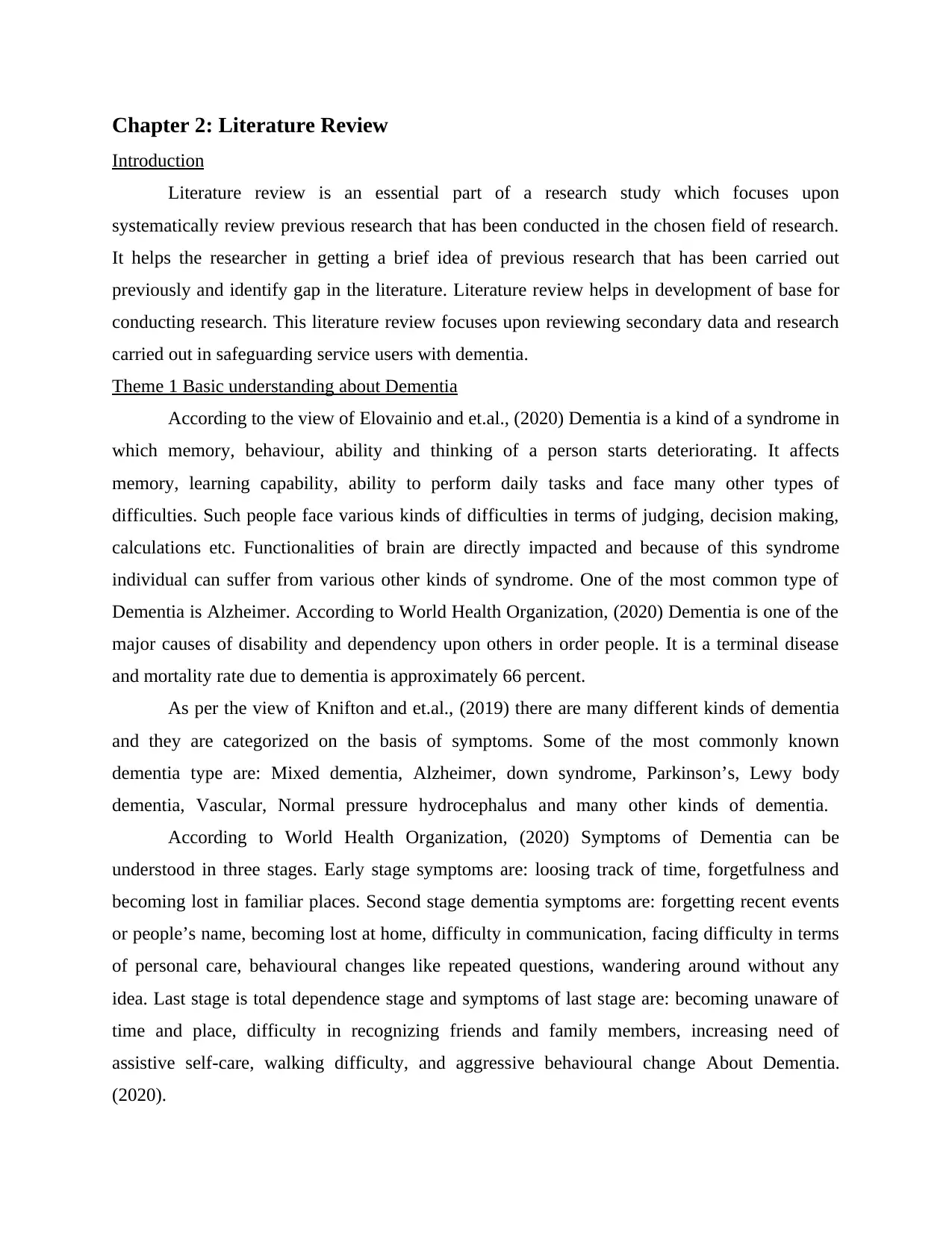
Chapter 2: Literature Review
Introduction
Literature review is an essential part of a research study which focuses upon
systematically review previous research that has been conducted in the chosen field of research.
It helps the researcher in getting a brief idea of previous research that has been carried out
previously and identify gap in the literature. Literature review helps in development of base for
conducting research. This literature review focuses upon reviewing secondary data and research
carried out in safeguarding service users with dementia.
Theme 1 Basic understanding about Dementia
According to the view of Elovainio and et.al., (2020) Dementia is a kind of a syndrome in
which memory, behaviour, ability and thinking of a person starts deteriorating. It affects
memory, learning capability, ability to perform daily tasks and face many other types of
difficulties. Such people face various kinds of difficulties in terms of judging, decision making,
calculations etc. Functionalities of brain are directly impacted and because of this syndrome
individual can suffer from various other kinds of syndrome. One of the most common type of
Dementia is Alzheimer. According to World Health Organization, (2020) Dementia is one of the
major causes of disability and dependency upon others in order people. It is a terminal disease
and mortality rate due to dementia is approximately 66 percent.
As per the view of Knifton and et.al., (2019) there are many different kinds of dementia
and they are categorized on the basis of symptoms. Some of the most commonly known
dementia type are: Mixed dementia, Alzheimer, down syndrome, Parkinson’s, Lewy body
dementia, Vascular, Normal pressure hydrocephalus and many other kinds of dementia.
According to World Health Organization, (2020) Symptoms of Dementia can be
understood in three stages. Early stage symptoms are: loosing track of time, forgetfulness and
becoming lost in familiar places. Second stage dementia symptoms are: forgetting recent events
or people’s name, becoming lost at home, difficulty in communication, facing difficulty in terms
of personal care, behavioural changes like repeated questions, wandering around without any
idea. Last stage is total dependence stage and symptoms of last stage are: becoming unaware of
time and place, difficulty in recognizing friends and family members, increasing need of
assistive self-care, walking difficulty, and aggressive behavioural change About Dementia.
(2020).
Introduction
Literature review is an essential part of a research study which focuses upon
systematically review previous research that has been conducted in the chosen field of research.
It helps the researcher in getting a brief idea of previous research that has been carried out
previously and identify gap in the literature. Literature review helps in development of base for
conducting research. This literature review focuses upon reviewing secondary data and research
carried out in safeguarding service users with dementia.
Theme 1 Basic understanding about Dementia
According to the view of Elovainio and et.al., (2020) Dementia is a kind of a syndrome in
which memory, behaviour, ability and thinking of a person starts deteriorating. It affects
memory, learning capability, ability to perform daily tasks and face many other types of
difficulties. Such people face various kinds of difficulties in terms of judging, decision making,
calculations etc. Functionalities of brain are directly impacted and because of this syndrome
individual can suffer from various other kinds of syndrome. One of the most common type of
Dementia is Alzheimer. According to World Health Organization, (2020) Dementia is one of the
major causes of disability and dependency upon others in order people. It is a terminal disease
and mortality rate due to dementia is approximately 66 percent.
As per the view of Knifton and et.al., (2019) there are many different kinds of dementia
and they are categorized on the basis of symptoms. Some of the most commonly known
dementia type are: Mixed dementia, Alzheimer, down syndrome, Parkinson’s, Lewy body
dementia, Vascular, Normal pressure hydrocephalus and many other kinds of dementia.
According to World Health Organization, (2020) Symptoms of Dementia can be
understood in three stages. Early stage symptoms are: loosing track of time, forgetfulness and
becoming lost in familiar places. Second stage dementia symptoms are: forgetting recent events
or people’s name, becoming lost at home, difficulty in communication, facing difficulty in terms
of personal care, behavioural changes like repeated questions, wandering around without any
idea. Last stage is total dependence stage and symptoms of last stage are: becoming unaware of
time and place, difficulty in recognizing friends and family members, increasing need of
assistive self-care, walking difficulty, and aggressive behavioural change About Dementia.
(2020).
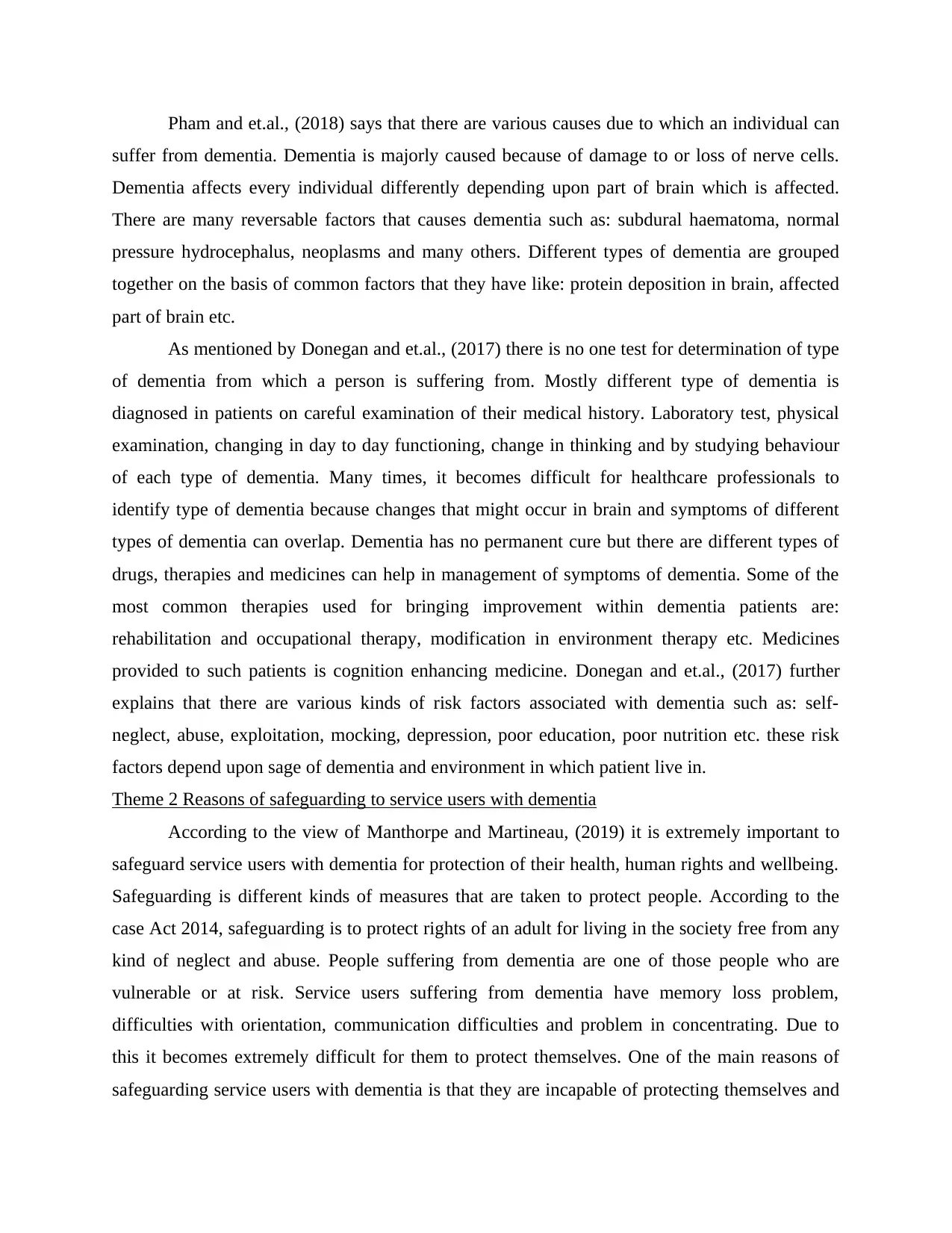
Pham and et.al., (2018) says that there are various causes due to which an individual can
suffer from dementia. Dementia is majorly caused because of damage to or loss of nerve cells.
Dementia affects every individual differently depending upon part of brain which is affected.
There are many reversable factors that causes dementia such as: subdural haematoma, normal
pressure hydrocephalus, neoplasms and many others. Different types of dementia are grouped
together on the basis of common factors that they have like: protein deposition in brain, affected
part of brain etc.
As mentioned by Donegan and et.al., (2017) there is no one test for determination of type
of dementia from which a person is suffering from. Mostly different type of dementia is
diagnosed in patients on careful examination of their medical history. Laboratory test, physical
examination, changing in day to day functioning, change in thinking and by studying behaviour
of each type of dementia. Many times, it becomes difficult for healthcare professionals to
identify type of dementia because changes that might occur in brain and symptoms of different
types of dementia can overlap. Dementia has no permanent cure but there are different types of
drugs, therapies and medicines can help in management of symptoms of dementia. Some of the
most common therapies used for bringing improvement within dementia patients are:
rehabilitation and occupational therapy, modification in environment therapy etc. Medicines
provided to such patients is cognition enhancing medicine. Donegan and et.al., (2017) further
explains that there are various kinds of risk factors associated with dementia such as: self-
neglect, abuse, exploitation, mocking, depression, poor education, poor nutrition etc. these risk
factors depend upon sage of dementia and environment in which patient live in.
Theme 2 Reasons of safeguarding to service users with dementia
According to the view of Manthorpe and Martineau, (2019) it is extremely important to
safeguard service users with dementia for protection of their health, human rights and wellbeing.
Safeguarding is different kinds of measures that are taken to protect people. According to the
case Act 2014, safeguarding is to protect rights of an adult for living in the society free from any
kind of neglect and abuse. People suffering from dementia are one of those people who are
vulnerable or at risk. Service users suffering from dementia have memory loss problem,
difficulties with orientation, communication difficulties and problem in concentrating. Due to
this it becomes extremely difficult for them to protect themselves. One of the main reasons of
safeguarding service users with dementia is that they are incapable of protecting themselves and
suffer from dementia. Dementia is majorly caused because of damage to or loss of nerve cells.
Dementia affects every individual differently depending upon part of brain which is affected.
There are many reversable factors that causes dementia such as: subdural haematoma, normal
pressure hydrocephalus, neoplasms and many others. Different types of dementia are grouped
together on the basis of common factors that they have like: protein deposition in brain, affected
part of brain etc.
As mentioned by Donegan and et.al., (2017) there is no one test for determination of type
of dementia from which a person is suffering from. Mostly different type of dementia is
diagnosed in patients on careful examination of their medical history. Laboratory test, physical
examination, changing in day to day functioning, change in thinking and by studying behaviour
of each type of dementia. Many times, it becomes difficult for healthcare professionals to
identify type of dementia because changes that might occur in brain and symptoms of different
types of dementia can overlap. Dementia has no permanent cure but there are different types of
drugs, therapies and medicines can help in management of symptoms of dementia. Some of the
most common therapies used for bringing improvement within dementia patients are:
rehabilitation and occupational therapy, modification in environment therapy etc. Medicines
provided to such patients is cognition enhancing medicine. Donegan and et.al., (2017) further
explains that there are various kinds of risk factors associated with dementia such as: self-
neglect, abuse, exploitation, mocking, depression, poor education, poor nutrition etc. these risk
factors depend upon sage of dementia and environment in which patient live in.
Theme 2 Reasons of safeguarding to service users with dementia
According to the view of Manthorpe and Martineau, (2019) it is extremely important to
safeguard service users with dementia for protection of their health, human rights and wellbeing.
Safeguarding is different kinds of measures that are taken to protect people. According to the
case Act 2014, safeguarding is to protect rights of an adult for living in the society free from any
kind of neglect and abuse. People suffering from dementia are one of those people who are
vulnerable or at risk. Service users suffering from dementia have memory loss problem,
difficulties with orientation, communication difficulties and problem in concentrating. Due to
this it becomes extremely difficult for them to protect themselves. One of the main reasons of
safeguarding service users with dementia is that they are incapable of protecting themselves and
Paraphrase This Document
Need a fresh take? Get an instant paraphrase of this document with our AI Paraphraser
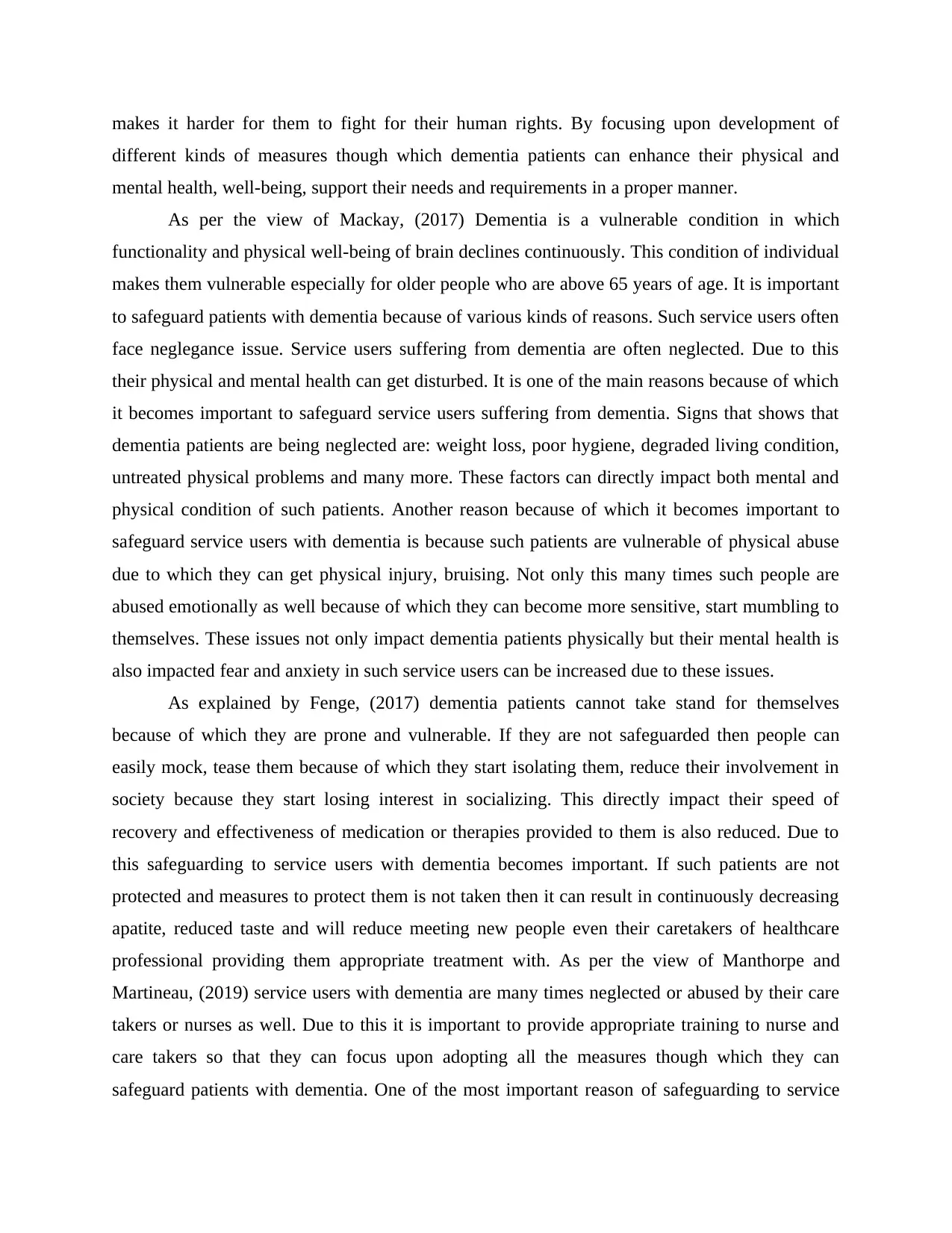
makes it harder for them to fight for their human rights. By focusing upon development of
different kinds of measures though which dementia patients can enhance their physical and
mental health, well-being, support their needs and requirements in a proper manner.
As per the view of Mackay, (2017) Dementia is a vulnerable condition in which
functionality and physical well-being of brain declines continuously. This condition of individual
makes them vulnerable especially for older people who are above 65 years of age. It is important
to safeguard patients with dementia because of various kinds of reasons. Such service users often
face neglegance issue. Service users suffering from dementia are often neglected. Due to this
their physical and mental health can get disturbed. It is one of the main reasons because of which
it becomes important to safeguard service users suffering from dementia. Signs that shows that
dementia patients are being neglected are: weight loss, poor hygiene, degraded living condition,
untreated physical problems and many more. These factors can directly impact both mental and
physical condition of such patients. Another reason because of which it becomes important to
safeguard service users with dementia is because such patients are vulnerable of physical abuse
due to which they can get physical injury, bruising. Not only this many times such people are
abused emotionally as well because of which they can become more sensitive, start mumbling to
themselves. These issues not only impact dementia patients physically but their mental health is
also impacted fear and anxiety in such service users can be increased due to these issues.
As explained by Fenge, (2017) dementia patients cannot take stand for themselves
because of which they are prone and vulnerable. If they are not safeguarded then people can
easily mock, tease them because of which they start isolating them, reduce their involvement in
society because they start losing interest in socializing. This directly impact their speed of
recovery and effectiveness of medication or therapies provided to them is also reduced. Due to
this safeguarding to service users with dementia becomes important. If such patients are not
protected and measures to protect them is not taken then it can result in continuously decreasing
apatite, reduced taste and will reduce meeting new people even their caretakers of healthcare
professional providing them appropriate treatment with. As per the view of Manthorpe and
Martineau, (2019) service users with dementia are many times neglected or abused by their care
takers or nurses as well. Due to this it is important to provide appropriate training to nurse and
care takers so that they can focus upon adopting all the measures though which they can
safeguard patients with dementia. One of the most important reason of safeguarding to service
different kinds of measures though which dementia patients can enhance their physical and
mental health, well-being, support their needs and requirements in a proper manner.
As per the view of Mackay, (2017) Dementia is a vulnerable condition in which
functionality and physical well-being of brain declines continuously. This condition of individual
makes them vulnerable especially for older people who are above 65 years of age. It is important
to safeguard patients with dementia because of various kinds of reasons. Such service users often
face neglegance issue. Service users suffering from dementia are often neglected. Due to this
their physical and mental health can get disturbed. It is one of the main reasons because of which
it becomes important to safeguard service users suffering from dementia. Signs that shows that
dementia patients are being neglected are: weight loss, poor hygiene, degraded living condition,
untreated physical problems and many more. These factors can directly impact both mental and
physical condition of such patients. Another reason because of which it becomes important to
safeguard service users with dementia is because such patients are vulnerable of physical abuse
due to which they can get physical injury, bruising. Not only this many times such people are
abused emotionally as well because of which they can become more sensitive, start mumbling to
themselves. These issues not only impact dementia patients physically but their mental health is
also impacted fear and anxiety in such service users can be increased due to these issues.
As explained by Fenge, (2017) dementia patients cannot take stand for themselves
because of which they are prone and vulnerable. If they are not safeguarded then people can
easily mock, tease them because of which they start isolating them, reduce their involvement in
society because they start losing interest in socializing. This directly impact their speed of
recovery and effectiveness of medication or therapies provided to them is also reduced. Due to
this safeguarding to service users with dementia becomes important. If such patients are not
protected and measures to protect them is not taken then it can result in continuously decreasing
apatite, reduced taste and will reduce meeting new people even their caretakers of healthcare
professional providing them appropriate treatment with. As per the view of Manthorpe and
Martineau, (2019) service users with dementia are many times neglected or abused by their care
takers or nurses as well. Due to this it is important to provide appropriate training to nurse and
care takers so that they can focus upon adopting all the measures though which they can
safeguard patients with dementia. One of the most important reason of safeguarding to service
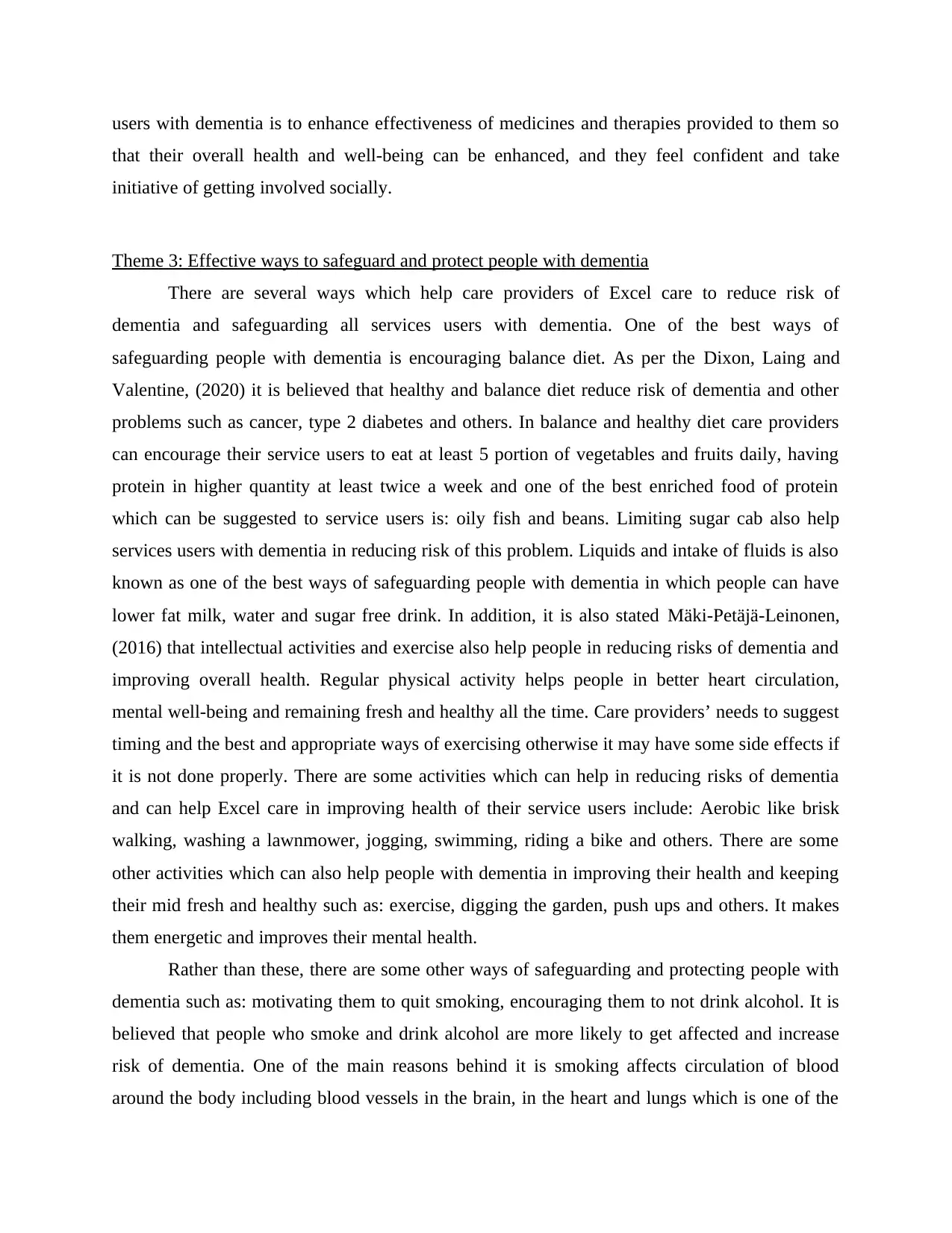
users with dementia is to enhance effectiveness of medicines and therapies provided to them so
that their overall health and well-being can be enhanced, and they feel confident and take
initiative of getting involved socially.
Theme 3: Effective ways to safeguard and protect people with dementia
There are several ways which help care providers of Excel care to reduce risk of
dementia and safeguarding all services users with dementia. One of the best ways of
safeguarding people with dementia is encouraging balance diet. As per the Dixon, Laing and
Valentine, (2020) it is believed that healthy and balance diet reduce risk of dementia and other
problems such as cancer, type 2 diabetes and others. In balance and healthy diet care providers
can encourage their service users to eat at least 5 portion of vegetables and fruits daily, having
protein in higher quantity at least twice a week and one of the best enriched food of protein
which can be suggested to service users is: oily fish and beans. Limiting sugar cab also help
services users with dementia in reducing risk of this problem. Liquids and intake of fluids is also
known as one of the best ways of safeguarding people with dementia in which people can have
lower fat milk, water and sugar free drink. In addition, it is also stated Mäki-Petäjä-Leinonen,
(2016) that intellectual activities and exercise also help people in reducing risks of dementia and
improving overall health. Regular physical activity helps people in better heart circulation,
mental well-being and remaining fresh and healthy all the time. Care providers’ needs to suggest
timing and the best and appropriate ways of exercising otherwise it may have some side effects if
it is not done properly. There are some activities which can help in reducing risks of dementia
and can help Excel care in improving health of their service users include: Aerobic like brisk
walking, washing a lawnmower, jogging, swimming, riding a bike and others. There are some
other activities which can also help people with dementia in improving their health and keeping
their mid fresh and healthy such as: exercise, digging the garden, push ups and others. It makes
them energetic and improves their mental health.
Rather than these, there are some other ways of safeguarding and protecting people with
dementia such as: motivating them to quit smoking, encouraging them to not drink alcohol. It is
believed that people who smoke and drink alcohol are more likely to get affected and increase
risk of dementia. One of the main reasons behind it is smoking affects circulation of blood
around the body including blood vessels in the brain, in the heart and lungs which is one of the
that their overall health and well-being can be enhanced, and they feel confident and take
initiative of getting involved socially.
Theme 3: Effective ways to safeguard and protect people with dementia
There are several ways which help care providers of Excel care to reduce risk of
dementia and safeguarding all services users with dementia. One of the best ways of
safeguarding people with dementia is encouraging balance diet. As per the Dixon, Laing and
Valentine, (2020) it is believed that healthy and balance diet reduce risk of dementia and other
problems such as cancer, type 2 diabetes and others. In balance and healthy diet care providers
can encourage their service users to eat at least 5 portion of vegetables and fruits daily, having
protein in higher quantity at least twice a week and one of the best enriched food of protein
which can be suggested to service users is: oily fish and beans. Limiting sugar cab also help
services users with dementia in reducing risk of this problem. Liquids and intake of fluids is also
known as one of the best ways of safeguarding people with dementia in which people can have
lower fat milk, water and sugar free drink. In addition, it is also stated Mäki-Petäjä-Leinonen,
(2016) that intellectual activities and exercise also help people in reducing risks of dementia and
improving overall health. Regular physical activity helps people in better heart circulation,
mental well-being and remaining fresh and healthy all the time. Care providers’ needs to suggest
timing and the best and appropriate ways of exercising otherwise it may have some side effects if
it is not done properly. There are some activities which can help in reducing risks of dementia
and can help Excel care in improving health of their service users include: Aerobic like brisk
walking, washing a lawnmower, jogging, swimming, riding a bike and others. There are some
other activities which can also help people with dementia in improving their health and keeping
their mid fresh and healthy such as: exercise, digging the garden, push ups and others. It makes
them energetic and improves their mental health.
Rather than these, there are some other ways of safeguarding and protecting people with
dementia such as: motivating them to quit smoking, encouraging them to not drink alcohol. It is
believed that people who smoke and drink alcohol are more likely to get affected and increase
risk of dementia. One of the main reasons behind it is smoking affects circulation of blood
around the body including blood vessels in the brain, in the heart and lungs which is one of the
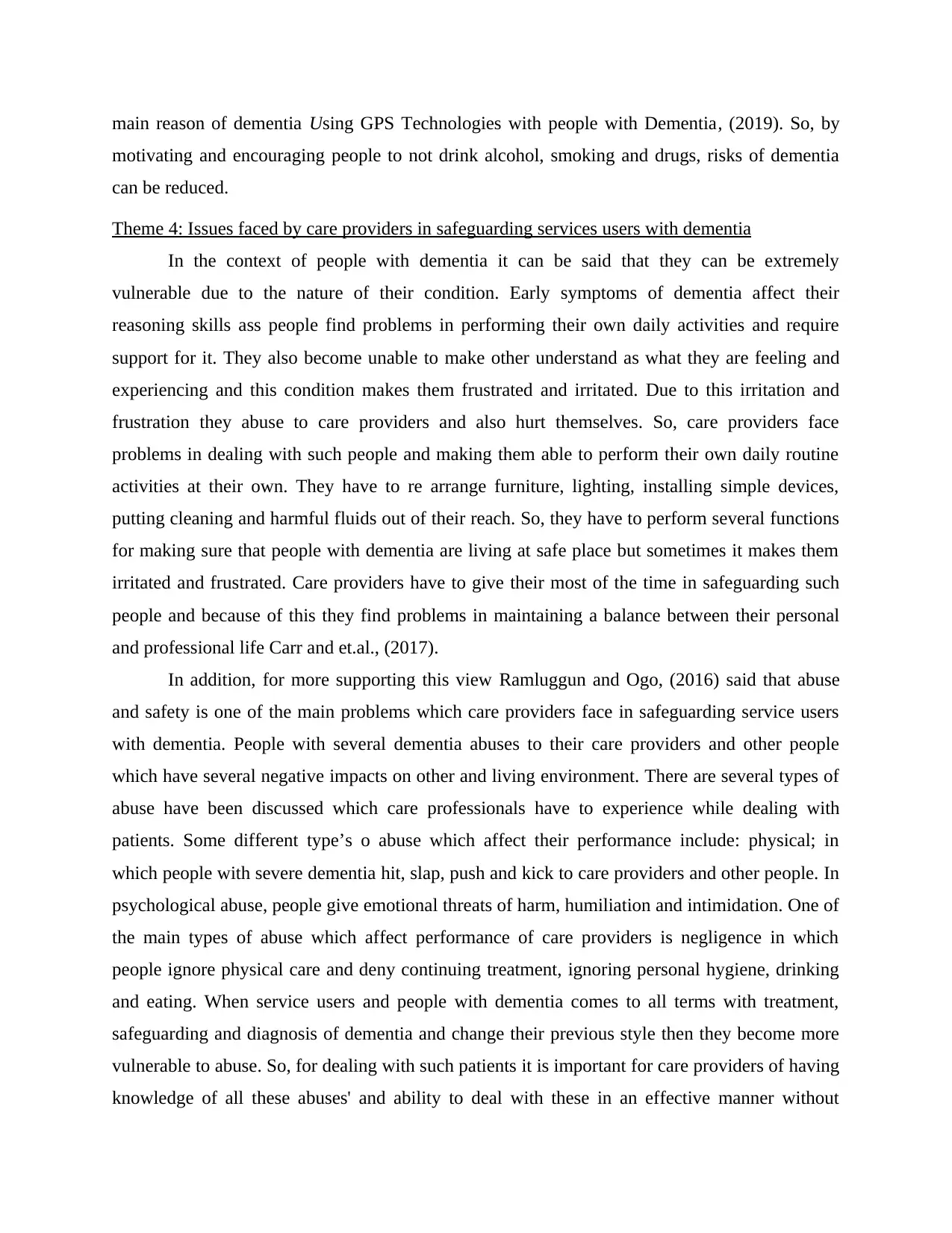
main reason of dementia Using GPS Technologies with people with Dementia, (2019). So, by
motivating and encouraging people to not drink alcohol, smoking and drugs, risks of dementia
can be reduced.
Theme 4: Issues faced by care providers in safeguarding services users with dementia
In the context of people with dementia it can be said that they can be extremely
vulnerable due to the nature of their condition. Early symptoms of dementia affect their
reasoning skills ass people find problems in performing their own daily activities and require
support for it. They also become unable to make other understand as what they are feeling and
experiencing and this condition makes them frustrated and irritated. Due to this irritation and
frustration they abuse to care providers and also hurt themselves. So, care providers face
problems in dealing with such people and making them able to perform their own daily routine
activities at their own. They have to re arrange furniture, lighting, installing simple devices,
putting cleaning and harmful fluids out of their reach. So, they have to perform several functions
for making sure that people with dementia are living at safe place but sometimes it makes them
irritated and frustrated. Care providers have to give their most of the time in safeguarding such
people and because of this they find problems in maintaining a balance between their personal
and professional life Carr and et.al., (2017).
In addition, for more supporting this view Ramluggun and Ogo, (2016) said that abuse
and safety is one of the main problems which care providers face in safeguarding service users
with dementia. People with several dementia abuses to their care providers and other people
which have several negative impacts on other and living environment. There are several types of
abuse have been discussed which care professionals have to experience while dealing with
patients. Some different type’s o abuse which affect their performance include: physical; in
which people with severe dementia hit, slap, push and kick to care providers and other people. In
psychological abuse, people give emotional threats of harm, humiliation and intimidation. One of
the main types of abuse which affect performance of care providers is negligence in which
people ignore physical care and deny continuing treatment, ignoring personal hygiene, drinking
and eating. When service users and people with dementia comes to all terms with treatment,
safeguarding and diagnosis of dementia and change their previous style then they become more
vulnerable to abuse. So, for dealing with such patients it is important for care providers of having
knowledge of all these abuses' and ability to deal with these in an effective manner without
motivating and encouraging people to not drink alcohol, smoking and drugs, risks of dementia
can be reduced.
Theme 4: Issues faced by care providers in safeguarding services users with dementia
In the context of people with dementia it can be said that they can be extremely
vulnerable due to the nature of their condition. Early symptoms of dementia affect their
reasoning skills ass people find problems in performing their own daily activities and require
support for it. They also become unable to make other understand as what they are feeling and
experiencing and this condition makes them frustrated and irritated. Due to this irritation and
frustration they abuse to care providers and also hurt themselves. So, care providers face
problems in dealing with such people and making them able to perform their own daily routine
activities at their own. They have to re arrange furniture, lighting, installing simple devices,
putting cleaning and harmful fluids out of their reach. So, they have to perform several functions
for making sure that people with dementia are living at safe place but sometimes it makes them
irritated and frustrated. Care providers have to give their most of the time in safeguarding such
people and because of this they find problems in maintaining a balance between their personal
and professional life Carr and et.al., (2017).
In addition, for more supporting this view Ramluggun and Ogo, (2016) said that abuse
and safety is one of the main problems which care providers face in safeguarding service users
with dementia. People with several dementia abuses to their care providers and other people
which have several negative impacts on other and living environment. There are several types of
abuse have been discussed which care professionals have to experience while dealing with
patients. Some different type’s o abuse which affect their performance include: physical; in
which people with severe dementia hit, slap, push and kick to care providers and other people. In
psychological abuse, people give emotional threats of harm, humiliation and intimidation. One of
the main types of abuse which affect performance of care providers is negligence in which
people ignore physical care and deny continuing treatment, ignoring personal hygiene, drinking
and eating. When service users and people with dementia comes to all terms with treatment,
safeguarding and diagnosis of dementia and change their previous style then they become more
vulnerable to abuse. So, for dealing with such patients it is important for care providers of having
knowledge of all these abuses' and ability to deal with these in an effective manner without
Secure Best Marks with AI Grader
Need help grading? Try our AI Grader for instant feedback on your assignments.
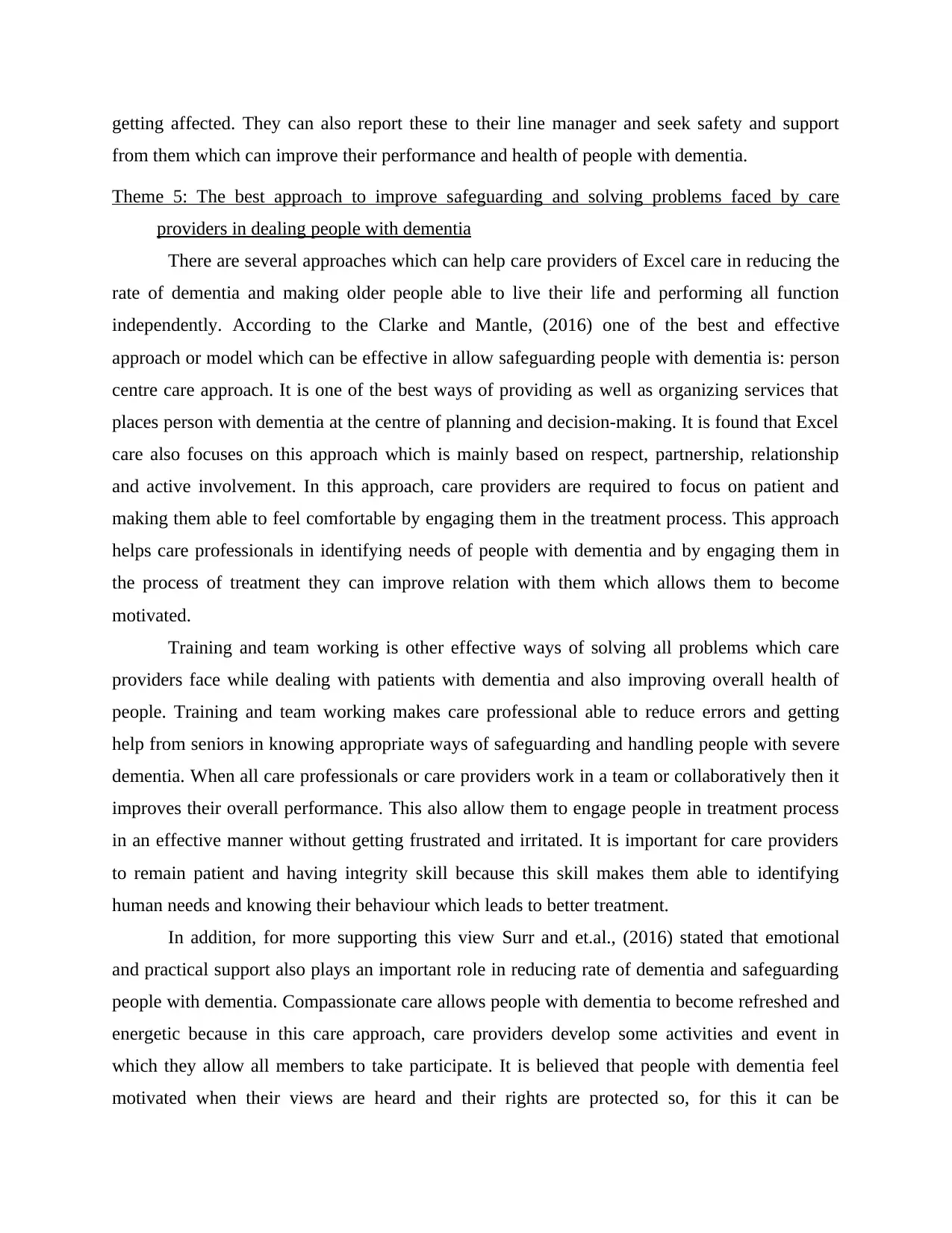
getting affected. They can also report these to their line manager and seek safety and support
from them which can improve their performance and health of people with dementia.
Theme 5: The best approach to improve safeguarding and solving problems faced by care
providers in dealing people with dementia
There are several approaches which can help care providers of Excel care in reducing the
rate of dementia and making older people able to live their life and performing all function
independently. According to the Clarke and Mantle, (2016) one of the best and effective
approach or model which can be effective in allow safeguarding people with dementia is: person
centre care approach. It is one of the best ways of providing as well as organizing services that
places person with dementia at the centre of planning and decision-making. It is found that Excel
care also focuses on this approach which is mainly based on respect, partnership, relationship
and active involvement. In this approach, care providers are required to focus on patient and
making them able to feel comfortable by engaging them in the treatment process. This approach
helps care professionals in identifying needs of people with dementia and by engaging them in
the process of treatment they can improve relation with them which allows them to become
motivated.
Training and team working is other effective ways of solving all problems which care
providers face while dealing with patients with dementia and also improving overall health of
people. Training and team working makes care professional able to reduce errors and getting
help from seniors in knowing appropriate ways of safeguarding and handling people with severe
dementia. When all care professionals or care providers work in a team or collaboratively then it
improves their overall performance. This also allow them to engage people in treatment process
in an effective manner without getting frustrated and irritated. It is important for care providers
to remain patient and having integrity skill because this skill makes them able to identifying
human needs and knowing their behaviour which leads to better treatment.
In addition, for more supporting this view Surr and et.al., (2016) stated that emotional
and practical support also plays an important role in reducing rate of dementia and safeguarding
people with dementia. Compassionate care allows people with dementia to become refreshed and
energetic because in this care approach, care providers develop some activities and event in
which they allow all members to take participate. It is believed that people with dementia feel
motivated when their views are heard and their rights are protected so, for this it can be
from them which can improve their performance and health of people with dementia.
Theme 5: The best approach to improve safeguarding and solving problems faced by care
providers in dealing people with dementia
There are several approaches which can help care providers of Excel care in reducing the
rate of dementia and making older people able to live their life and performing all function
independently. According to the Clarke and Mantle, (2016) one of the best and effective
approach or model which can be effective in allow safeguarding people with dementia is: person
centre care approach. It is one of the best ways of providing as well as organizing services that
places person with dementia at the centre of planning and decision-making. It is found that Excel
care also focuses on this approach which is mainly based on respect, partnership, relationship
and active involvement. In this approach, care providers are required to focus on patient and
making them able to feel comfortable by engaging them in the treatment process. This approach
helps care professionals in identifying needs of people with dementia and by engaging them in
the process of treatment they can improve relation with them which allows them to become
motivated.
Training and team working is other effective ways of solving all problems which care
providers face while dealing with patients with dementia and also improving overall health of
people. Training and team working makes care professional able to reduce errors and getting
help from seniors in knowing appropriate ways of safeguarding and handling people with severe
dementia. When all care professionals or care providers work in a team or collaboratively then it
improves their overall performance. This also allow them to engage people in treatment process
in an effective manner without getting frustrated and irritated. It is important for care providers
to remain patient and having integrity skill because this skill makes them able to identifying
human needs and knowing their behaviour which leads to better treatment.
In addition, for more supporting this view Surr and et.al., (2016) stated that emotional
and practical support also plays an important role in reducing rate of dementia and safeguarding
people with dementia. Compassionate care allows people with dementia to become refreshed and
energetic because in this care approach, care providers develop some activities and event in
which they allow all members to take participate. It is believed that people with dementia feel
motivated when their views are heard and their rights are protected so, for this it can be

recommended that care providers require taking feedbacks and engaging them in ongoing family
involvement approach for promoting access to advocacy. There are several other ways of
interacting and engaging people with severe dementia such as: reassuring words, gentle touch,
experiencing happiness, true connection and quite encouragement.
involvement approach for promoting access to advocacy. There are several other ways of
interacting and engaging people with severe dementia such as: reassuring words, gentle touch,
experiencing happiness, true connection and quite encouragement.
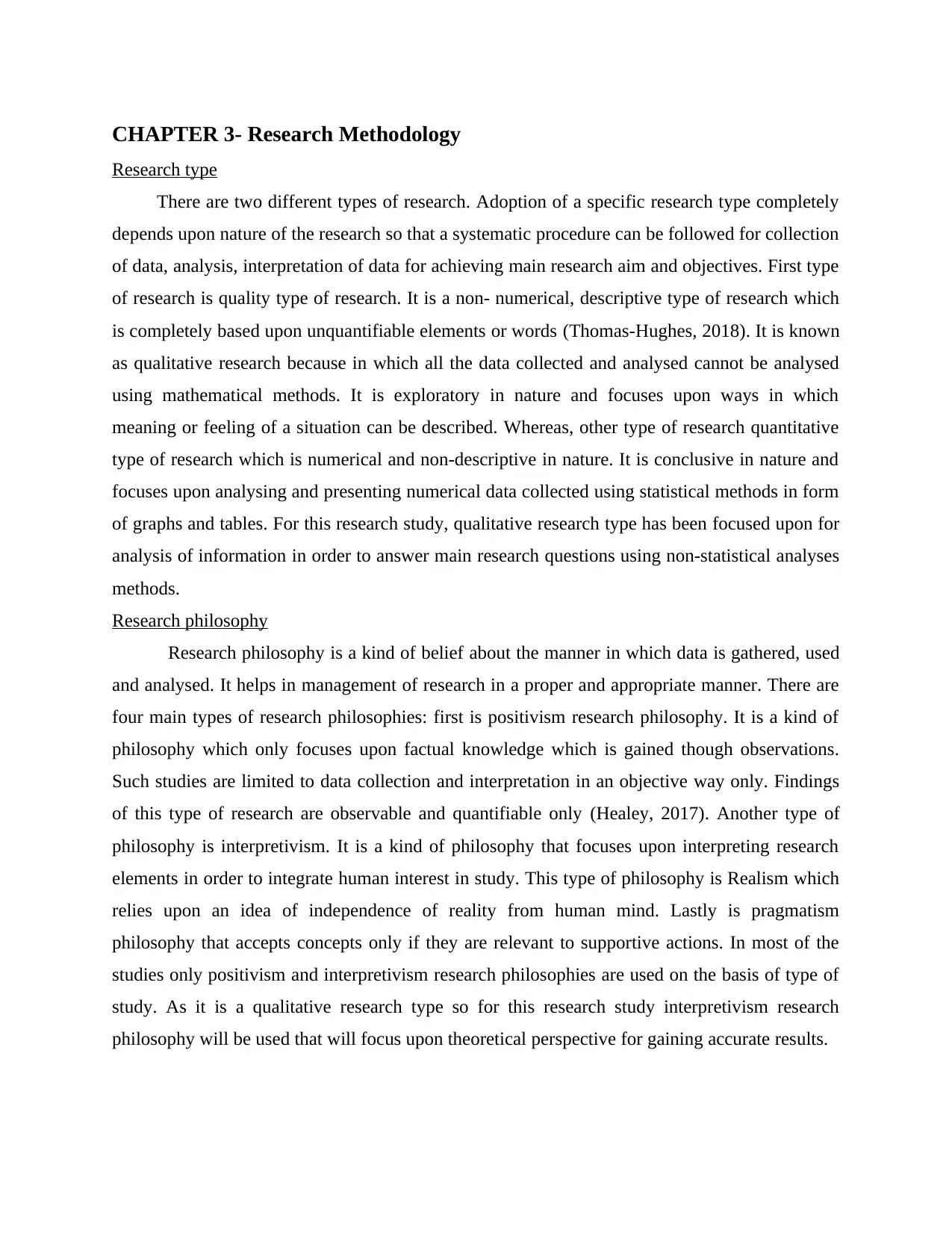
CHAPTER 3- Research Methodology
Research type
There are two different types of research. Adoption of a specific research type completely
depends upon nature of the research so that a systematic procedure can be followed for collection
of data, analysis, interpretation of data for achieving main research aim and objectives. First type
of research is quality type of research. It is a non- numerical, descriptive type of research which
is completely based upon unquantifiable elements or words (Thomas-Hughes, 2018). It is known
as qualitative research because in which all the data collected and analysed cannot be analysed
using mathematical methods. It is exploratory in nature and focuses upon ways in which
meaning or feeling of a situation can be described. Whereas, other type of research quantitative
type of research which is numerical and non-descriptive in nature. It is conclusive in nature and
focuses upon analysing and presenting numerical data collected using statistical methods in form
of graphs and tables. For this research study, qualitative research type has been focused upon for
analysis of information in order to answer main research questions using non-statistical analyses
methods.
Research philosophy
Research philosophy is a kind of belief about the manner in which data is gathered, used
and analysed. It helps in management of research in a proper and appropriate manner. There are
four main types of research philosophies: first is positivism research philosophy. It is a kind of
philosophy which only focuses upon factual knowledge which is gained though observations.
Such studies are limited to data collection and interpretation in an objective way only. Findings
of this type of research are observable and quantifiable only (Healey, 2017). Another type of
philosophy is interpretivism. It is a kind of philosophy that focuses upon interpreting research
elements in order to integrate human interest in study. This type of philosophy is Realism which
relies upon an idea of independence of reality from human mind. Lastly is pragmatism
philosophy that accepts concepts only if they are relevant to supportive actions. In most of the
studies only positivism and interpretivism research philosophies are used on the basis of type of
study. As it is a qualitative research type so for this research study interpretivism research
philosophy will be used that will focus upon theoretical perspective for gaining accurate results.
Research type
There are two different types of research. Adoption of a specific research type completely
depends upon nature of the research so that a systematic procedure can be followed for collection
of data, analysis, interpretation of data for achieving main research aim and objectives. First type
of research is quality type of research. It is a non- numerical, descriptive type of research which
is completely based upon unquantifiable elements or words (Thomas-Hughes, 2018). It is known
as qualitative research because in which all the data collected and analysed cannot be analysed
using mathematical methods. It is exploratory in nature and focuses upon ways in which
meaning or feeling of a situation can be described. Whereas, other type of research quantitative
type of research which is numerical and non-descriptive in nature. It is conclusive in nature and
focuses upon analysing and presenting numerical data collected using statistical methods in form
of graphs and tables. For this research study, qualitative research type has been focused upon for
analysis of information in order to answer main research questions using non-statistical analyses
methods.
Research philosophy
Research philosophy is a kind of belief about the manner in which data is gathered, used
and analysed. It helps in management of research in a proper and appropriate manner. There are
four main types of research philosophies: first is positivism research philosophy. It is a kind of
philosophy which only focuses upon factual knowledge which is gained though observations.
Such studies are limited to data collection and interpretation in an objective way only. Findings
of this type of research are observable and quantifiable only (Healey, 2017). Another type of
philosophy is interpretivism. It is a kind of philosophy that focuses upon interpreting research
elements in order to integrate human interest in study. This type of philosophy is Realism which
relies upon an idea of independence of reality from human mind. Lastly is pragmatism
philosophy that accepts concepts only if they are relevant to supportive actions. In most of the
studies only positivism and interpretivism research philosophies are used on the basis of type of
study. As it is a qualitative research type so for this research study interpretivism research
philosophy will be used that will focus upon theoretical perspective for gaining accurate results.
Paraphrase This Document
Need a fresh take? Get an instant paraphrase of this document with our AI Paraphraser
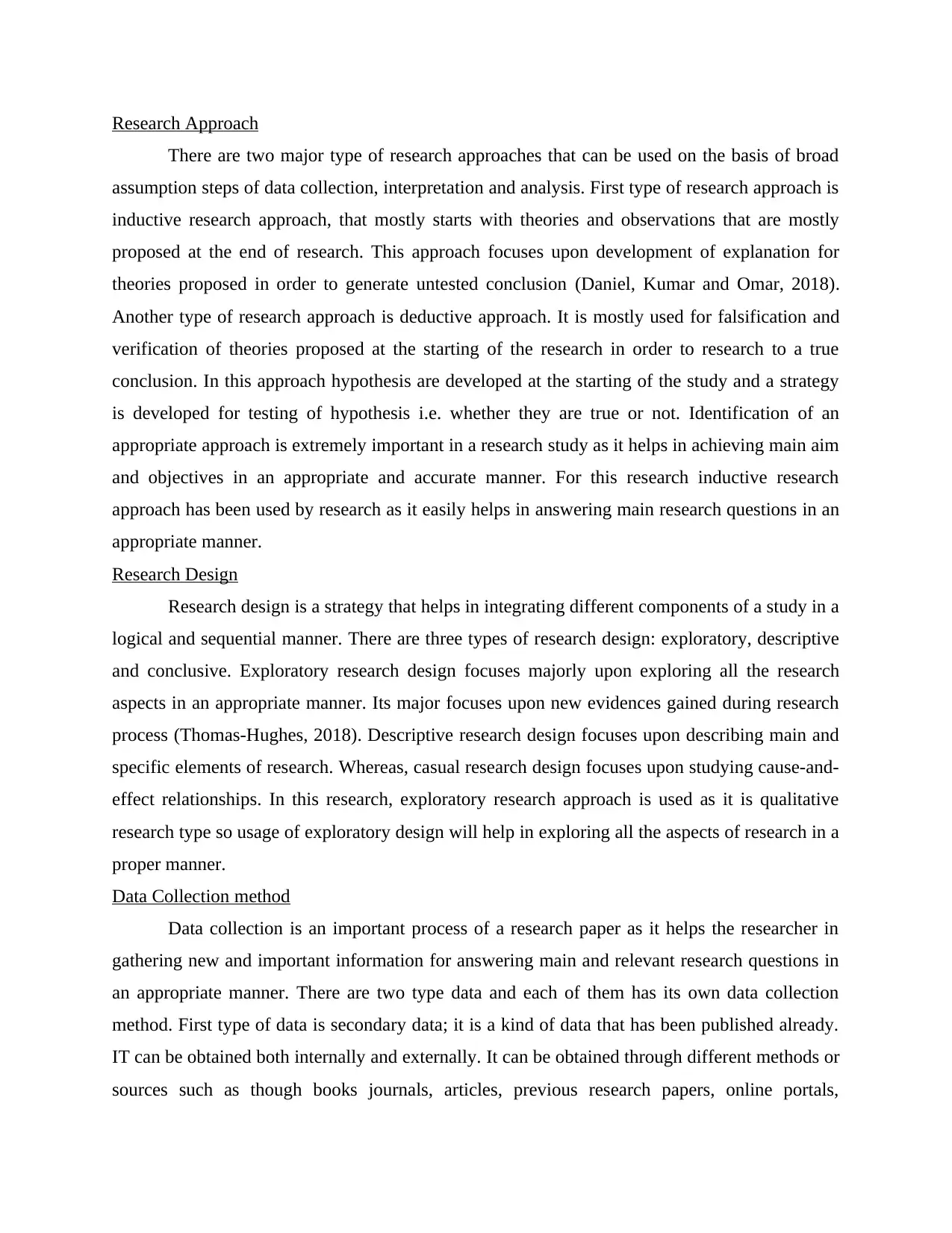
Research Approach
There are two major type of research approaches that can be used on the basis of broad
assumption steps of data collection, interpretation and analysis. First type of research approach is
inductive research approach, that mostly starts with theories and observations that are mostly
proposed at the end of research. This approach focuses upon development of explanation for
theories proposed in order to generate untested conclusion (Daniel, Kumar and Omar, 2018).
Another type of research approach is deductive approach. It is mostly used for falsification and
verification of theories proposed at the starting of the research in order to research to a true
conclusion. In this approach hypothesis are developed at the starting of the study and a strategy
is developed for testing of hypothesis i.e. whether they are true or not. Identification of an
appropriate approach is extremely important in a research study as it helps in achieving main aim
and objectives in an appropriate and accurate manner. For this research inductive research
approach has been used by research as it easily helps in answering main research questions in an
appropriate manner.
Research Design
Research design is a strategy that helps in integrating different components of a study in a
logical and sequential manner. There are three types of research design: exploratory, descriptive
and conclusive. Exploratory research design focuses majorly upon exploring all the research
aspects in an appropriate manner. Its major focuses upon new evidences gained during research
process (Thomas-Hughes, 2018). Descriptive research design focuses upon describing main and
specific elements of research. Whereas, casual research design focuses upon studying cause-and-
effect relationships. In this research, exploratory research approach is used as it is qualitative
research type so usage of exploratory design will help in exploring all the aspects of research in a
proper manner.
Data Collection method
Data collection is an important process of a research paper as it helps the researcher in
gathering new and important information for answering main and relevant research questions in
an appropriate manner. There are two type data and each of them has its own data collection
method. First type of data is secondary data; it is a kind of data that has been published already.
IT can be obtained both internally and externally. It can be obtained through different methods or
sources such as though books journals, articles, previous research papers, online portals,
There are two major type of research approaches that can be used on the basis of broad
assumption steps of data collection, interpretation and analysis. First type of research approach is
inductive research approach, that mostly starts with theories and observations that are mostly
proposed at the end of research. This approach focuses upon development of explanation for
theories proposed in order to generate untested conclusion (Daniel, Kumar and Omar, 2018).
Another type of research approach is deductive approach. It is mostly used for falsification and
verification of theories proposed at the starting of the research in order to research to a true
conclusion. In this approach hypothesis are developed at the starting of the study and a strategy
is developed for testing of hypothesis i.e. whether they are true or not. Identification of an
appropriate approach is extremely important in a research study as it helps in achieving main aim
and objectives in an appropriate and accurate manner. For this research inductive research
approach has been used by research as it easily helps in answering main research questions in an
appropriate manner.
Research Design
Research design is a strategy that helps in integrating different components of a study in a
logical and sequential manner. There are three types of research design: exploratory, descriptive
and conclusive. Exploratory research design focuses majorly upon exploring all the research
aspects in an appropriate manner. Its major focuses upon new evidences gained during research
process (Thomas-Hughes, 2018). Descriptive research design focuses upon describing main and
specific elements of research. Whereas, casual research design focuses upon studying cause-and-
effect relationships. In this research, exploratory research approach is used as it is qualitative
research type so usage of exploratory design will help in exploring all the aspects of research in a
proper manner.
Data Collection method
Data collection is an important process of a research paper as it helps the researcher in
gathering new and important information for answering main and relevant research questions in
an appropriate manner. There are two type data and each of them has its own data collection
method. First type of data is secondary data; it is a kind of data that has been published already.
IT can be obtained both internally and externally. It can be obtained through different methods or
sources such as though books journals, articles, previous research papers, online portals,
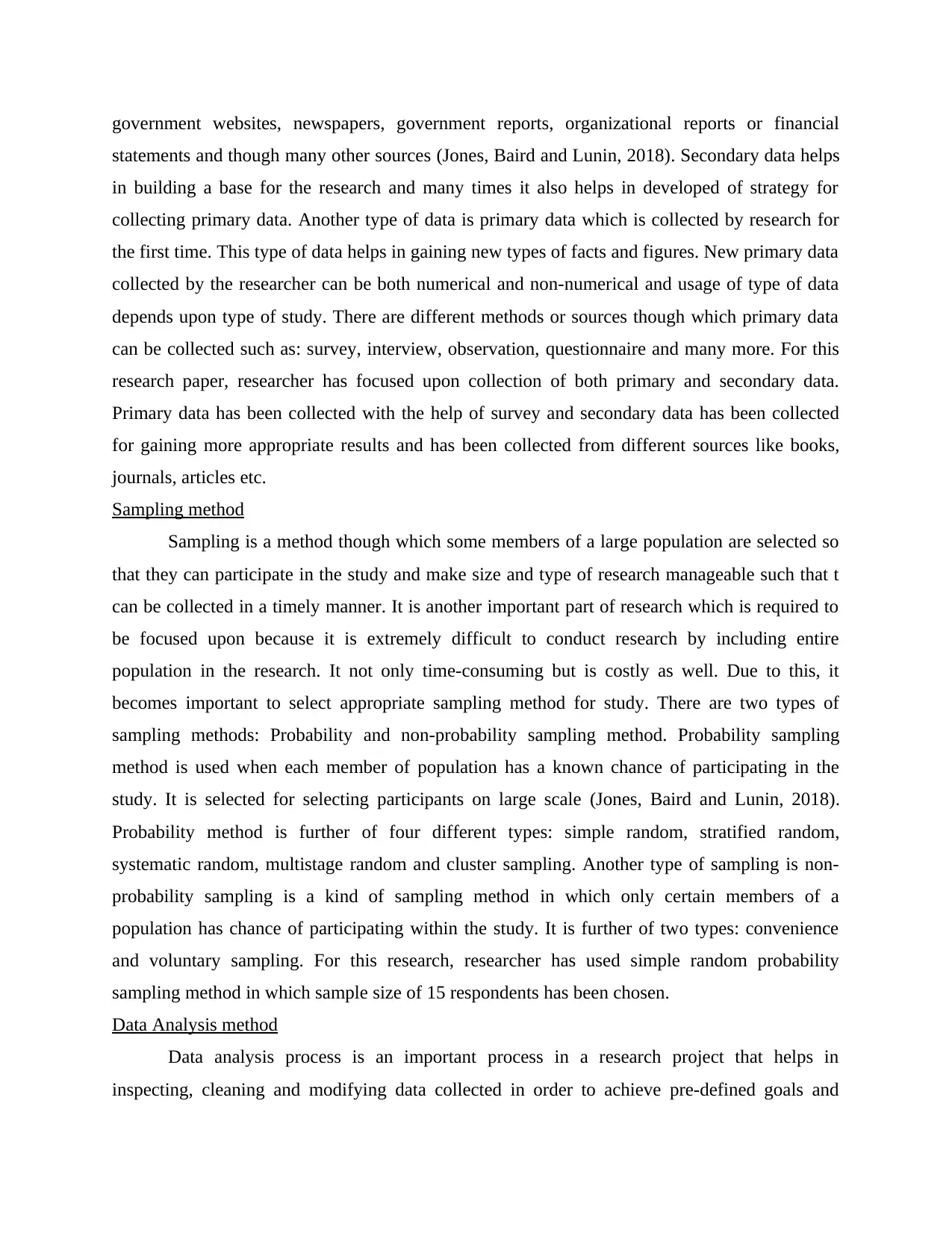
government websites, newspapers, government reports, organizational reports or financial
statements and though many other sources (Jones, Baird and Lunin, 2018). Secondary data helps
in building a base for the research and many times it also helps in developed of strategy for
collecting primary data. Another type of data is primary data which is collected by research for
the first time. This type of data helps in gaining new types of facts and figures. New primary data
collected by the researcher can be both numerical and non-numerical and usage of type of data
depends upon type of study. There are different methods or sources though which primary data
can be collected such as: survey, interview, observation, questionnaire and many more. For this
research paper, researcher has focused upon collection of both primary and secondary data.
Primary data has been collected with the help of survey and secondary data has been collected
for gaining more appropriate results and has been collected from different sources like books,
journals, articles etc.
Sampling method
Sampling is a method though which some members of a large population are selected so
that they can participate in the study and make size and type of research manageable such that t
can be collected in a timely manner. It is another important part of research which is required to
be focused upon because it is extremely difficult to conduct research by including entire
population in the research. It not only time-consuming but is costly as well. Due to this, it
becomes important to select appropriate sampling method for study. There are two types of
sampling methods: Probability and non-probability sampling method. Probability sampling
method is used when each member of population has a known chance of participating in the
study. It is selected for selecting participants on large scale (Jones, Baird and Lunin, 2018).
Probability method is further of four different types: simple random, stratified random,
systematic random, multistage random and cluster sampling. Another type of sampling is non-
probability sampling is a kind of sampling method in which only certain members of a
population has chance of participating within the study. It is further of two types: convenience
and voluntary sampling. For this research, researcher has used simple random probability
sampling method in which sample size of 15 respondents has been chosen.
Data Analysis method
Data analysis process is an important process in a research project that helps in
inspecting, cleaning and modifying data collected in order to achieve pre-defined goals and
statements and though many other sources (Jones, Baird and Lunin, 2018). Secondary data helps
in building a base for the research and many times it also helps in developed of strategy for
collecting primary data. Another type of data is primary data which is collected by research for
the first time. This type of data helps in gaining new types of facts and figures. New primary data
collected by the researcher can be both numerical and non-numerical and usage of type of data
depends upon type of study. There are different methods or sources though which primary data
can be collected such as: survey, interview, observation, questionnaire and many more. For this
research paper, researcher has focused upon collection of both primary and secondary data.
Primary data has been collected with the help of survey and secondary data has been collected
for gaining more appropriate results and has been collected from different sources like books,
journals, articles etc.
Sampling method
Sampling is a method though which some members of a large population are selected so
that they can participate in the study and make size and type of research manageable such that t
can be collected in a timely manner. It is another important part of research which is required to
be focused upon because it is extremely difficult to conduct research by including entire
population in the research. It not only time-consuming but is costly as well. Due to this, it
becomes important to select appropriate sampling method for study. There are two types of
sampling methods: Probability and non-probability sampling method. Probability sampling
method is used when each member of population has a known chance of participating in the
study. It is selected for selecting participants on large scale (Jones, Baird and Lunin, 2018).
Probability method is further of four different types: simple random, stratified random,
systematic random, multistage random and cluster sampling. Another type of sampling is non-
probability sampling is a kind of sampling method in which only certain members of a
population has chance of participating within the study. It is further of two types: convenience
and voluntary sampling. For this research, researcher has used simple random probability
sampling method in which sample size of 15 respondents has been chosen.
Data Analysis method
Data analysis process is an important process in a research project that helps in
inspecting, cleaning and modifying data collected in order to achieve pre-defined goals and
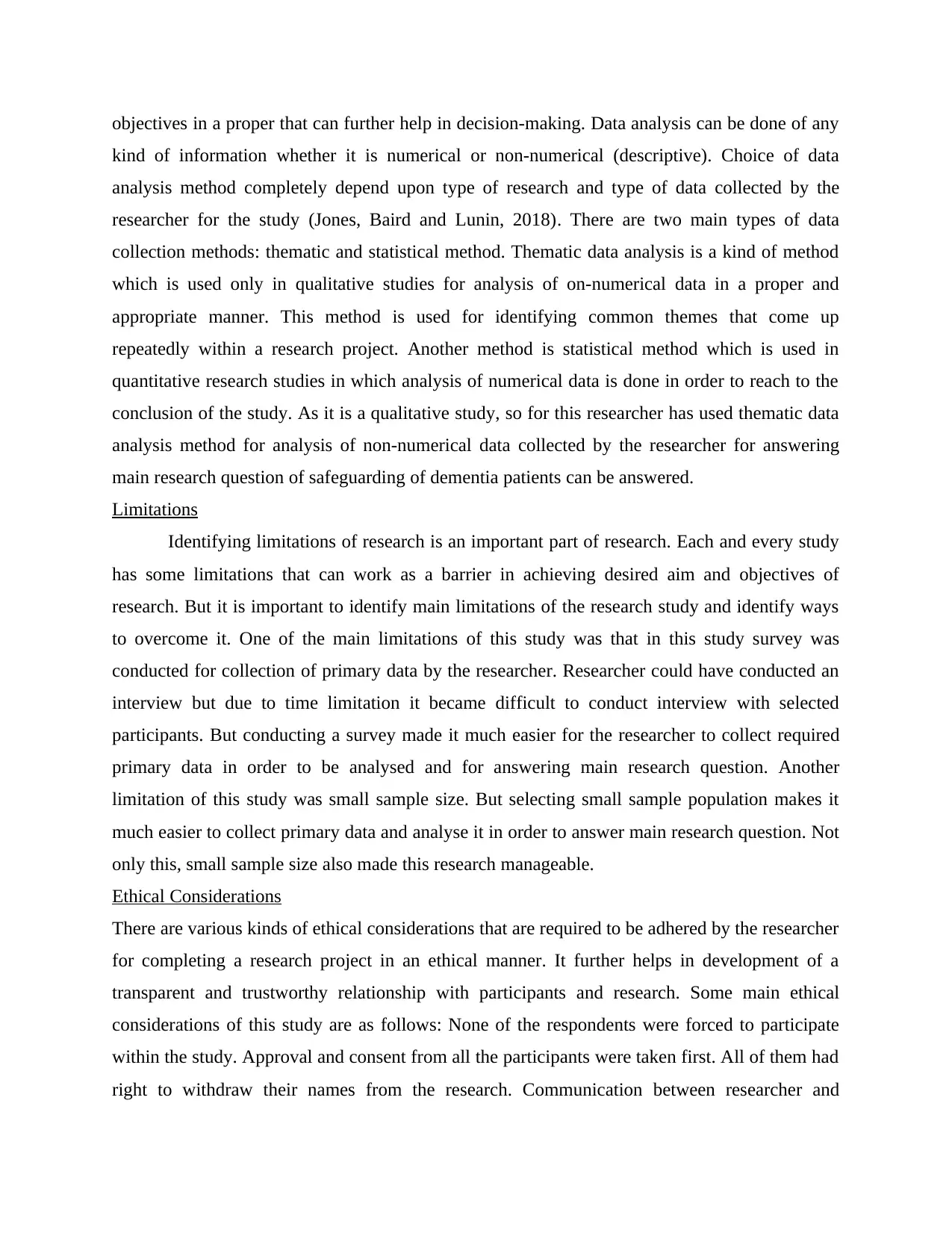
objectives in a proper that can further help in decision-making. Data analysis can be done of any
kind of information whether it is numerical or non-numerical (descriptive). Choice of data
analysis method completely depend upon type of research and type of data collected by the
researcher for the study (Jones, Baird and Lunin, 2018). There are two main types of data
collection methods: thematic and statistical method. Thematic data analysis is a kind of method
which is used only in qualitative studies for analysis of on-numerical data in a proper and
appropriate manner. This method is used for identifying common themes that come up
repeatedly within a research project. Another method is statistical method which is used in
quantitative research studies in which analysis of numerical data is done in order to reach to the
conclusion of the study. As it is a qualitative study, so for this researcher has used thematic data
analysis method for analysis of non-numerical data collected by the researcher for answering
main research question of safeguarding of dementia patients can be answered.
Limitations
Identifying limitations of research is an important part of research. Each and every study
has some limitations that can work as a barrier in achieving desired aim and objectives of
research. But it is important to identify main limitations of the research study and identify ways
to overcome it. One of the main limitations of this study was that in this study survey was
conducted for collection of primary data by the researcher. Researcher could have conducted an
interview but due to time limitation it became difficult to conduct interview with selected
participants. But conducting a survey made it much easier for the researcher to collect required
primary data in order to be analysed and for answering main research question. Another
limitation of this study was small sample size. But selecting small sample population makes it
much easier to collect primary data and analyse it in order to answer main research question. Not
only this, small sample size also made this research manageable.
Ethical Considerations
There are various kinds of ethical considerations that are required to be adhered by the researcher
for completing a research project in an ethical manner. It further helps in development of a
transparent and trustworthy relationship with participants and research. Some main ethical
considerations of this study are as follows: None of the respondents were forced to participate
within the study. Approval and consent from all the participants were taken first. All of them had
right to withdraw their names from the research. Communication between researcher and
kind of information whether it is numerical or non-numerical (descriptive). Choice of data
analysis method completely depend upon type of research and type of data collected by the
researcher for the study (Jones, Baird and Lunin, 2018). There are two main types of data
collection methods: thematic and statistical method. Thematic data analysis is a kind of method
which is used only in qualitative studies for analysis of on-numerical data in a proper and
appropriate manner. This method is used for identifying common themes that come up
repeatedly within a research project. Another method is statistical method which is used in
quantitative research studies in which analysis of numerical data is done in order to reach to the
conclusion of the study. As it is a qualitative study, so for this researcher has used thematic data
analysis method for analysis of non-numerical data collected by the researcher for answering
main research question of safeguarding of dementia patients can be answered.
Limitations
Identifying limitations of research is an important part of research. Each and every study
has some limitations that can work as a barrier in achieving desired aim and objectives of
research. But it is important to identify main limitations of the research study and identify ways
to overcome it. One of the main limitations of this study was that in this study survey was
conducted for collection of primary data by the researcher. Researcher could have conducted an
interview but due to time limitation it became difficult to conduct interview with selected
participants. But conducting a survey made it much easier for the researcher to collect required
primary data in order to be analysed and for answering main research question. Another
limitation of this study was small sample size. But selecting small sample population makes it
much easier to collect primary data and analyse it in order to answer main research question. Not
only this, small sample size also made this research manageable.
Ethical Considerations
There are various kinds of ethical considerations that are required to be adhered by the researcher
for completing a research project in an ethical manner. It further helps in development of a
transparent and trustworthy relationship with participants and research. Some main ethical
considerations of this study are as follows: None of the respondents were forced to participate
within the study. Approval and consent from all the participants were taken first. All of them had
right to withdraw their names from the research. Communication between researcher and
Secure Best Marks with AI Grader
Need help grading? Try our AI Grader for instant feedback on your assignments.

participants was honest and transparent. All the participants were first of all explained with main
aim and objective of the research and only after that they were asked to participate within the
study. All the information provided to participants were true and none of the information that can
mislead them were provided to them. Adequate level of confidentiality was maintained this
project and personal information or details of participants were also kept confidential.
aim and objective of the research and only after that they were asked to participate within the
study. All the information provided to participants were true and none of the information that can
mislead them were provided to them. Adequate level of confidentiality was maintained this
project and personal information or details of participants were also kept confidential.
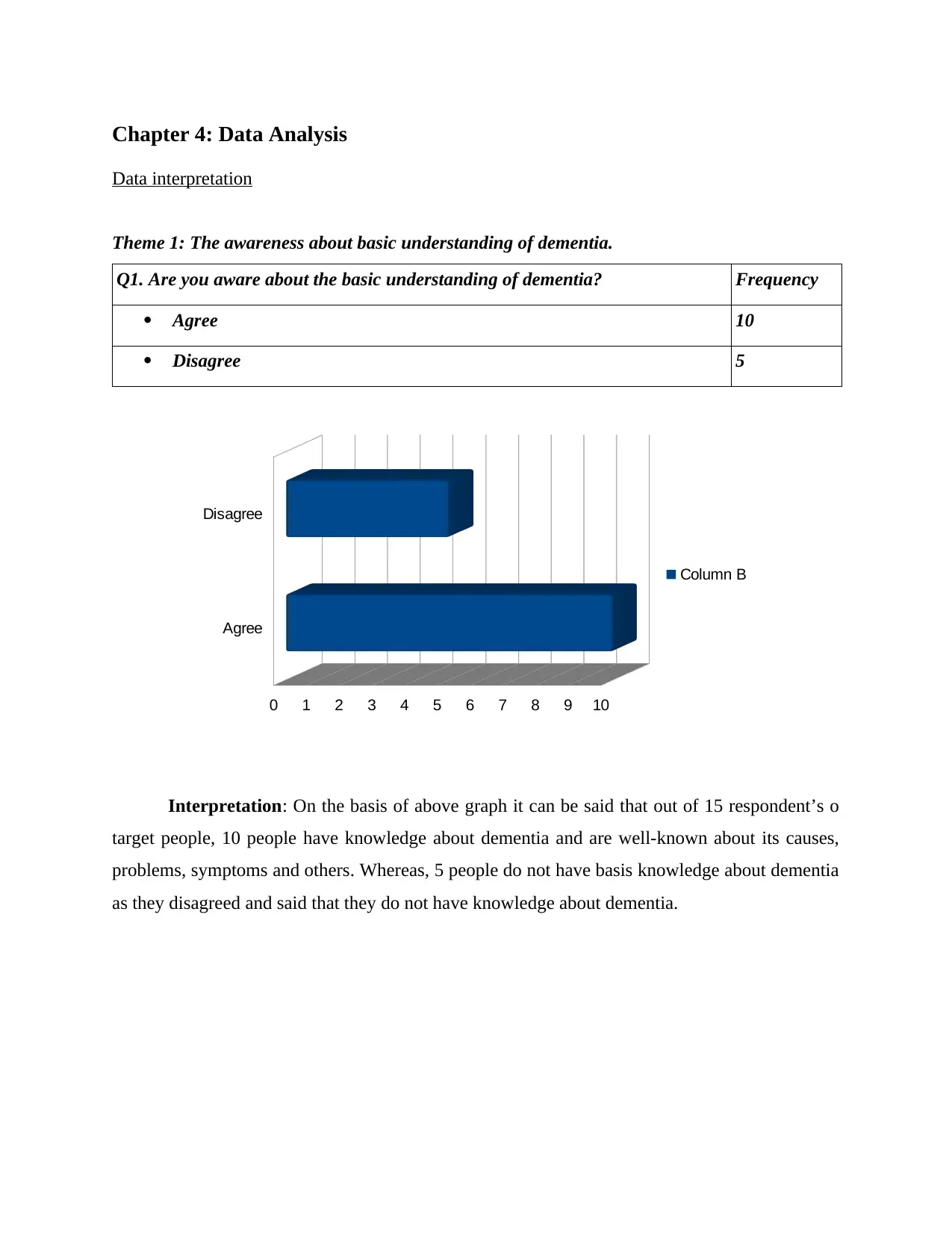
Chapter 4: Data Analysis
Data interpretation
Theme 1: The awareness about basic understanding of dementia.
Q1. Are you aware about the basic understanding of dementia? Frequency
Agree 10
Disagree 5
Interpretation: On the basis of above graph it can be said that out of 15 respondent’s o
target people, 10 people have knowledge about dementia and are well-known about its causes,
problems, symptoms and others. Whereas, 5 people do not have basis knowledge about dementia
as they disagreed and said that they do not have knowledge about dementia.
Agree
Disagree
0 1 2 3 4 5 6 7 8 9 10
Column B
Data interpretation
Theme 1: The awareness about basic understanding of dementia.
Q1. Are you aware about the basic understanding of dementia? Frequency
Agree 10
Disagree 5
Interpretation: On the basis of above graph it can be said that out of 15 respondent’s o
target people, 10 people have knowledge about dementia and are well-known about its causes,
problems, symptoms and others. Whereas, 5 people do not have basis knowledge about dementia
as they disagreed and said that they do not have knowledge about dementia.
Agree
Disagree
0 1 2 3 4 5 6 7 8 9 10
Column B

Theme 2: The maintenance of dignity by carer while treating.
Q2. Do your carers treat you with dignity? Frequency Yes 9 No 6
Interpretation: On the basis of above graph it can clearly be said that majority of
patients or people with dementia get effective treatment from their care providers as they stated
that their care providers treat them with dignity and it motivates and make them feel valued. On
the other hand, 6 people with dementia stated that they did not experience dignity while
receiving care from their carer.
Theme 3: The received support for maintaining independence.
Q3. Does the support you receive help to maintain your independence? Frequency Strongly agree 5 Agree 4 Disagree 3
9
6
Yes
No
Q2. Do your carers treat you with dignity? Frequency Yes 9 No 6
Interpretation: On the basis of above graph it can clearly be said that majority of
patients or people with dementia get effective treatment from their care providers as they stated
that their care providers treat them with dignity and it motivates and make them feel valued. On
the other hand, 6 people with dementia stated that they did not experience dignity while
receiving care from their carer.
Theme 3: The received support for maintaining independence.
Q3. Does the support you receive help to maintain your independence? Frequency Strongly agree 5 Agree 4 Disagree 3
9
6
Yes
No
Paraphrase This Document
Need a fresh take? Get an instant paraphrase of this document with our AI Paraphraser
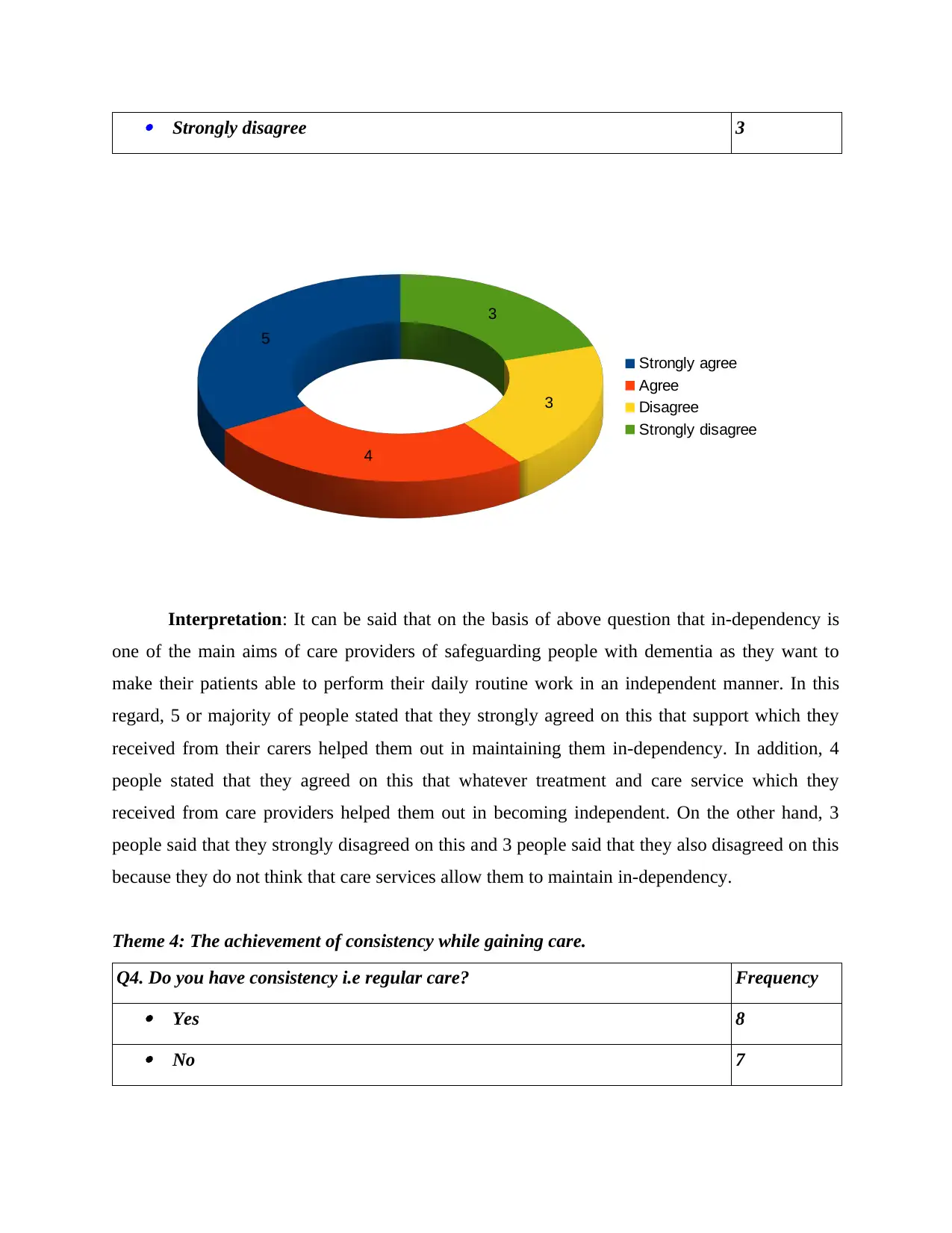
Strongly disagree 3
Interpretation: It can be said that on the basis of above question that in-dependency is
one of the main aims of care providers of safeguarding people with dementia as they want to
make their patients able to perform their daily routine work in an independent manner. In this
regard, 5 or majority of people stated that they strongly agreed on this that support which they
received from their carers helped them out in maintaining them in-dependency. In addition, 4
people stated that they agreed on this that whatever treatment and care service which they
received from care providers helped them out in becoming independent. On the other hand, 3
people said that they strongly disagreed on this and 3 people said that they also disagreed on this
because they do not think that care services allow them to maintain in-dependency.
Theme 4: The achievement of consistency while gaining care.
Q4. Do you have consistency i.e regular care? Frequency Yes 8 No 7
5
4
3
3
Strongly agree
Agree
Disagree
Strongly disagree
Interpretation: It can be said that on the basis of above question that in-dependency is
one of the main aims of care providers of safeguarding people with dementia as they want to
make their patients able to perform their daily routine work in an independent manner. In this
regard, 5 or majority of people stated that they strongly agreed on this that support which they
received from their carers helped them out in maintaining them in-dependency. In addition, 4
people stated that they agreed on this that whatever treatment and care service which they
received from care providers helped them out in becoming independent. On the other hand, 3
people said that they strongly disagreed on this and 3 people said that they also disagreed on this
because they do not think that care services allow them to maintain in-dependency.
Theme 4: The achievement of consistency while gaining care.
Q4. Do you have consistency i.e regular care? Frequency Yes 8 No 7
5
4
3
3
Strongly agree
Agree
Disagree
Strongly disagree
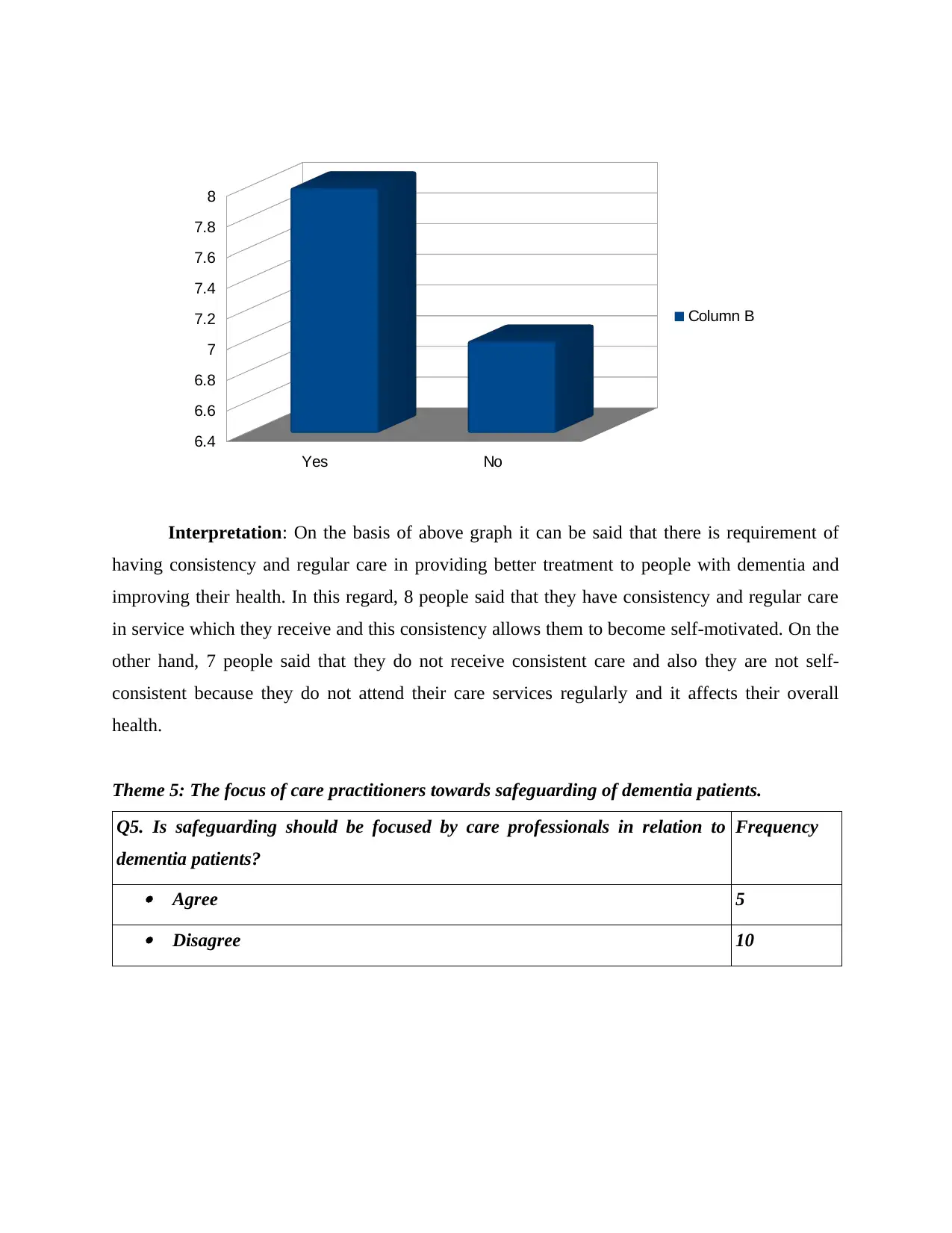
Interpretation: On the basis of above graph it can be said that there is requirement of
having consistency and regular care in providing better treatment to people with dementia and
improving their health. In this regard, 8 people said that they have consistency and regular care
in service which they receive and this consistency allows them to become self-motivated. On the
other hand, 7 people said that they do not receive consistent care and also they are not self-
consistent because they do not attend their care services regularly and it affects their overall
health.
Theme 5: The focus of care practitioners towards safeguarding of dementia patients.
Q5. Is safeguarding should be focused by care professionals in relation to
dementia patients?
Frequency
Agree 5 Disagree 10
Yes No
6.4
6.6
6.8
7
7.2
7.4
7.6
7.8
8
Column B
having consistency and regular care in providing better treatment to people with dementia and
improving their health. In this regard, 8 people said that they have consistency and regular care
in service which they receive and this consistency allows them to become self-motivated. On the
other hand, 7 people said that they do not receive consistent care and also they are not self-
consistent because they do not attend their care services regularly and it affects their overall
health.
Theme 5: The focus of care practitioners towards safeguarding of dementia patients.
Q5. Is safeguarding should be focused by care professionals in relation to
dementia patients?
Frequency
Agree 5 Disagree 10
Yes No
6.4
6.6
6.8
7
7.2
7.4
7.6
7.8
8
Column B
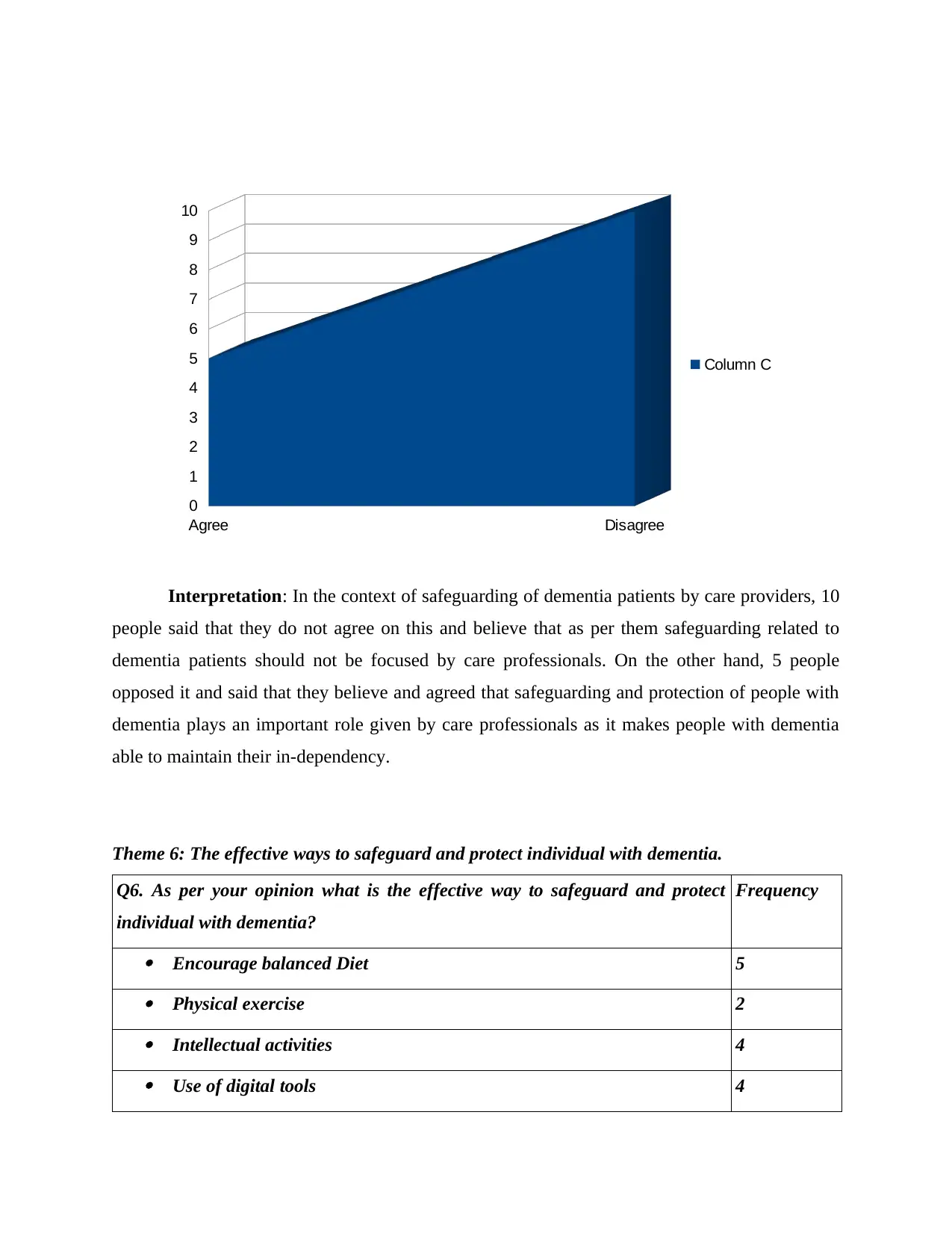
Interpretation: In the context of safeguarding of dementia patients by care providers, 10
people said that they do not agree on this and believe that as per them safeguarding related to
dementia patients should not be focused by care professionals. On the other hand, 5 people
opposed it and said that they believe and agreed that safeguarding and protection of people with
dementia plays an important role given by care professionals as it makes people with dementia
able to maintain their in-dependency.
Theme 6: The effective ways to safeguard and protect individual with dementia.
Q6. As per your opinion what is the effective way to safeguard and protect
individual with dementia?
Frequency
Encourage balanced Diet 5 Physical exercise 2 Intellectual activities 4 Use of digital tools 4
Agree Disagree
0
1
2
3
4
5
6
7
8
9
10
Column C
people said that they do not agree on this and believe that as per them safeguarding related to
dementia patients should not be focused by care professionals. On the other hand, 5 people
opposed it and said that they believe and agreed that safeguarding and protection of people with
dementia plays an important role given by care professionals as it makes people with dementia
able to maintain their in-dependency.
Theme 6: The effective ways to safeguard and protect individual with dementia.
Q6. As per your opinion what is the effective way to safeguard and protect
individual with dementia?
Frequency
Encourage balanced Diet 5 Physical exercise 2 Intellectual activities 4 Use of digital tools 4
Agree Disagree
0
1
2
3
4
5
6
7
8
9
10
Column C
Secure Best Marks with AI Grader
Need help grading? Try our AI Grader for instant feedback on your assignments.
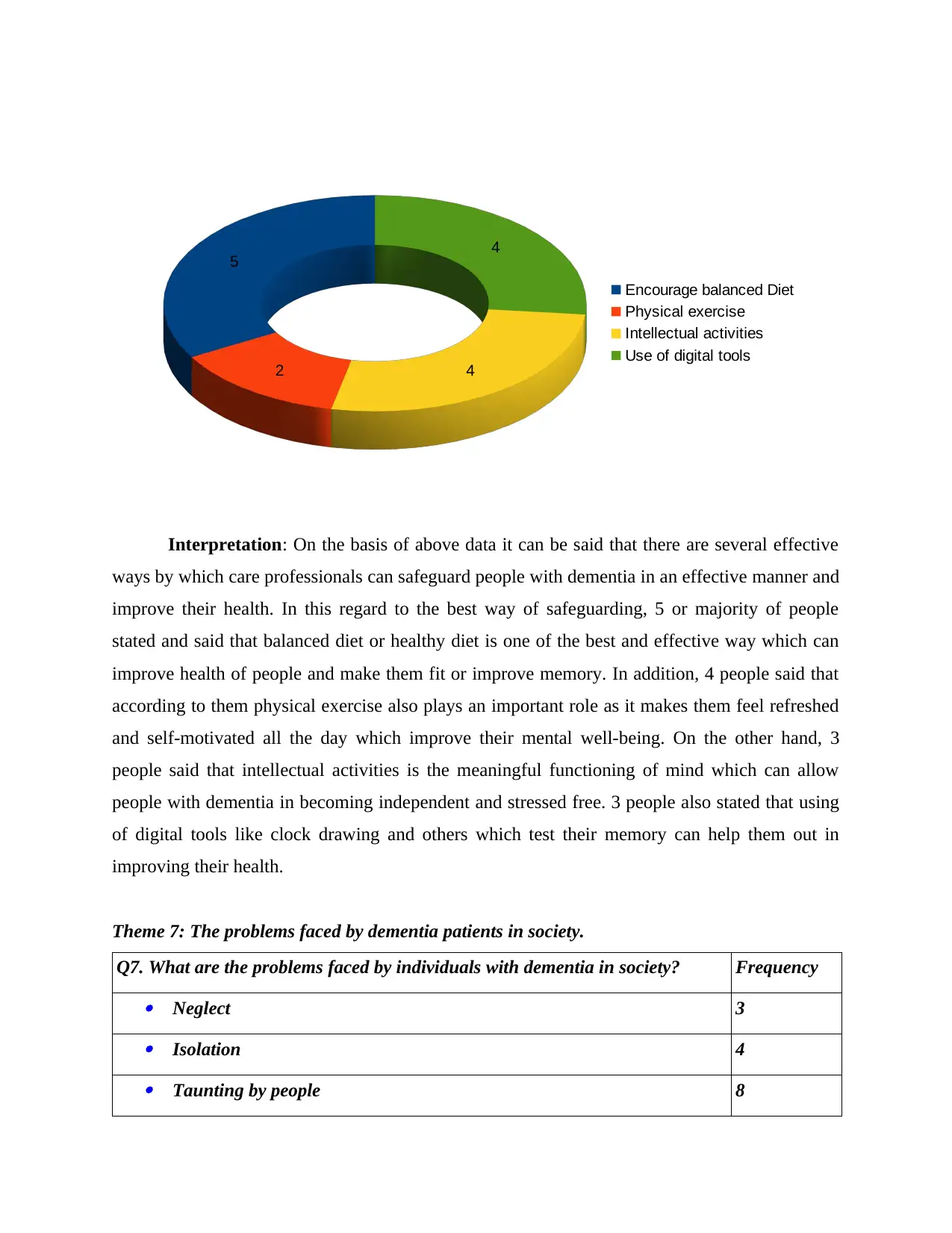
Interpretation: On the basis of above data it can be said that there are several effective
ways by which care professionals can safeguard people with dementia in an effective manner and
improve their health. In this regard to the best way of safeguarding, 5 or majority of people
stated and said that balanced diet or healthy diet is one of the best and effective way which can
improve health of people and make them fit or improve memory. In addition, 4 people said that
according to them physical exercise also plays an important role as it makes them feel refreshed
and self-motivated all the day which improve their mental well-being. On the other hand, 3
people said that intellectual activities is the meaningful functioning of mind which can allow
people with dementia in becoming independent and stressed free. 3 people also stated that using
of digital tools like clock drawing and others which test their memory can help them out in
improving their health.
Theme 7: The problems faced by dementia patients in society.
Q7. What are the problems faced by individuals with dementia in society? Frequency Neglect 3 Isolation 4 Taunting by people 8
5
2 4
4
Encourage balanced Diet
Physical exercise
Intellectual activities
Use of digital tools
ways by which care professionals can safeguard people with dementia in an effective manner and
improve their health. In this regard to the best way of safeguarding, 5 or majority of people
stated and said that balanced diet or healthy diet is one of the best and effective way which can
improve health of people and make them fit or improve memory. In addition, 4 people said that
according to them physical exercise also plays an important role as it makes them feel refreshed
and self-motivated all the day which improve their mental well-being. On the other hand, 3
people said that intellectual activities is the meaningful functioning of mind which can allow
people with dementia in becoming independent and stressed free. 3 people also stated that using
of digital tools like clock drawing and others which test their memory can help them out in
improving their health.
Theme 7: The problems faced by dementia patients in society.
Q7. What are the problems faced by individuals with dementia in society? Frequency Neglect 3 Isolation 4 Taunting by people 8
5
2 4
4
Encourage balanced Diet
Physical exercise
Intellectual activities
Use of digital tools
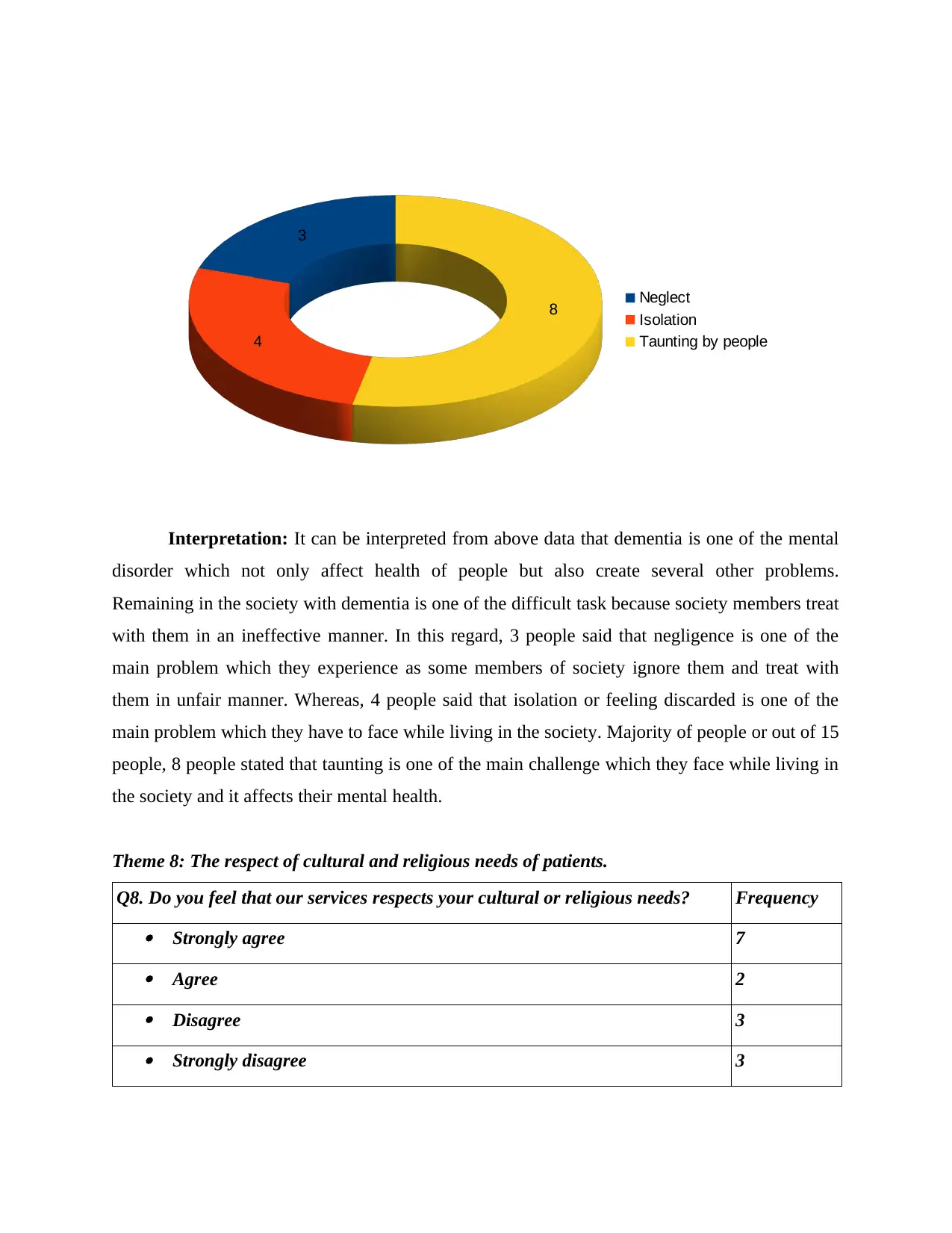
Interpretation: It can be interpreted from above data that dementia is one of the mental
disorder which not only affect health of people but also create several other problems.
Remaining in the society with dementia is one of the difficult task because society members treat
with them in an ineffective manner. In this regard, 3 people said that negligence is one of the
main problem which they experience as some members of society ignore them and treat with
them in unfair manner. Whereas, 4 people said that isolation or feeling discarded is one of the
main problem which they have to face while living in the society. Majority of people or out of 15
people, 8 people stated that taunting is one of the main challenge which they face while living in
the society and it affects their mental health.
Theme 8: The respect of cultural and religious needs of patients.
Q8. Do you feel that our services respects your cultural or religious needs? Frequency Strongly agree 7 Agree 2 Disagree 3 Strongly disagree 3
3
4
8 Neglect
Isolation
Taunting by people
disorder which not only affect health of people but also create several other problems.
Remaining in the society with dementia is one of the difficult task because society members treat
with them in an ineffective manner. In this regard, 3 people said that negligence is one of the
main problem which they experience as some members of society ignore them and treat with
them in unfair manner. Whereas, 4 people said that isolation or feeling discarded is one of the
main problem which they have to face while living in the society. Majority of people or out of 15
people, 8 people stated that taunting is one of the main challenge which they face while living in
the society and it affects their mental health.
Theme 8: The respect of cultural and religious needs of patients.
Q8. Do you feel that our services respects your cultural or religious needs? Frequency Strongly agree 7 Agree 2 Disagree 3 Strongly disagree 3
3
4
8 Neglect
Isolation
Taunting by people
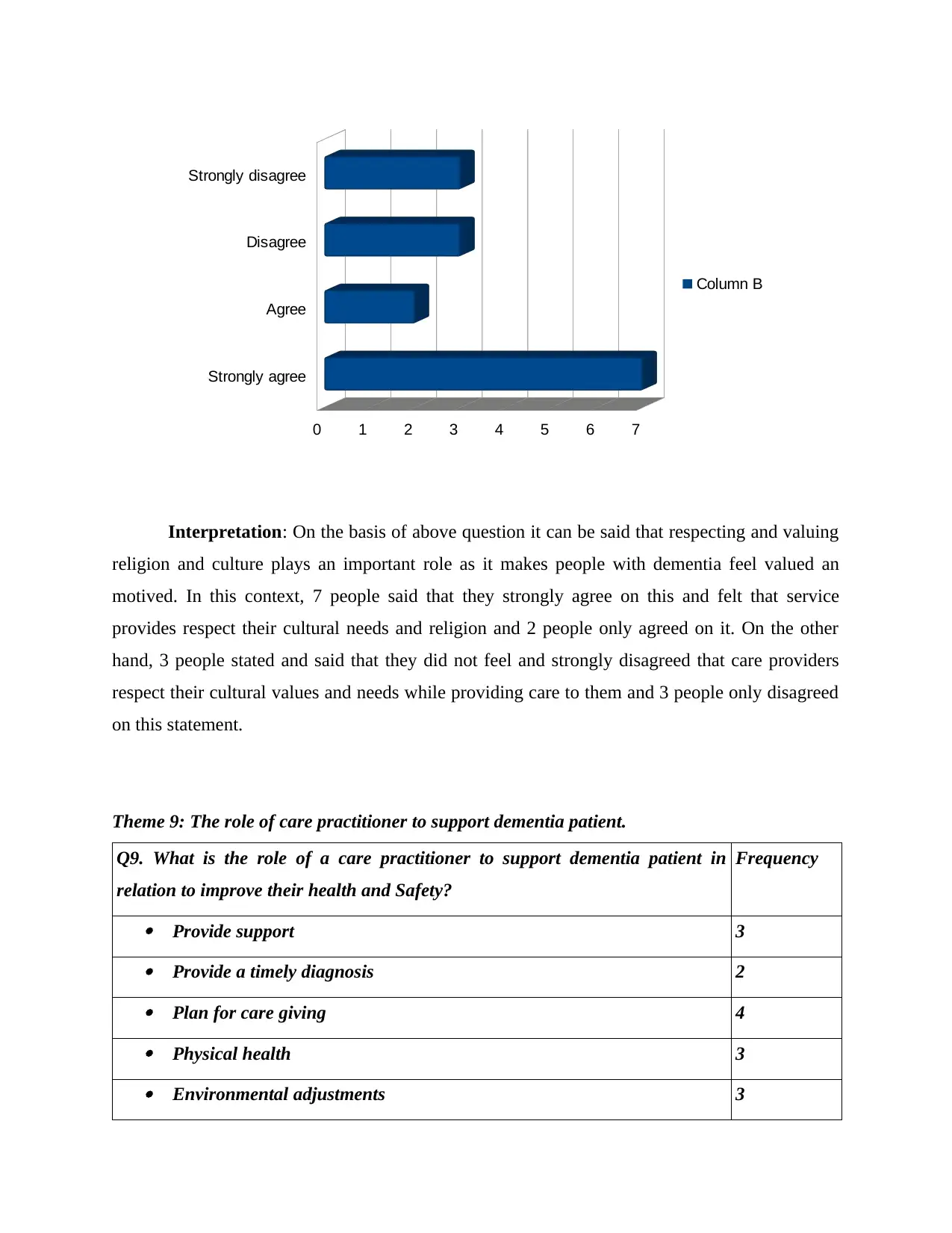
Interpretation: On the basis of above question it can be said that respecting and valuing
religion and culture plays an important role as it makes people with dementia feel valued an
motived. In this context, 7 people said that they strongly agree on this and felt that service
provides respect their cultural needs and religion and 2 people only agreed on it. On the other
hand, 3 people stated and said that they did not feel and strongly disagreed that care providers
respect their cultural values and needs while providing care to them and 3 people only disagreed
on this statement.
Theme 9: The role of care practitioner to support dementia patient.
Q9. What is the role of a care practitioner to support dementia patient in
relation to improve their health and Safety?
Frequency
Provide support 3 Provide a timely diagnosis 2 Plan for care giving 4 Physical health 3 Environmental adjustments 3
Strongly agree
Agree
Disagree
Strongly disagree
0 1 2 3 4 5 6 7
Column B
religion and culture plays an important role as it makes people with dementia feel valued an
motived. In this context, 7 people said that they strongly agree on this and felt that service
provides respect their cultural needs and religion and 2 people only agreed on it. On the other
hand, 3 people stated and said that they did not feel and strongly disagreed that care providers
respect their cultural values and needs while providing care to them and 3 people only disagreed
on this statement.
Theme 9: The role of care practitioner to support dementia patient.
Q9. What is the role of a care practitioner to support dementia patient in
relation to improve their health and Safety?
Frequency
Provide support 3 Provide a timely diagnosis 2 Plan for care giving 4 Physical health 3 Environmental adjustments 3
Strongly agree
Agree
Disagree
Strongly disagree
0 1 2 3 4 5 6 7
Column B
Paraphrase This Document
Need a fresh take? Get an instant paraphrase of this document with our AI Paraphraser
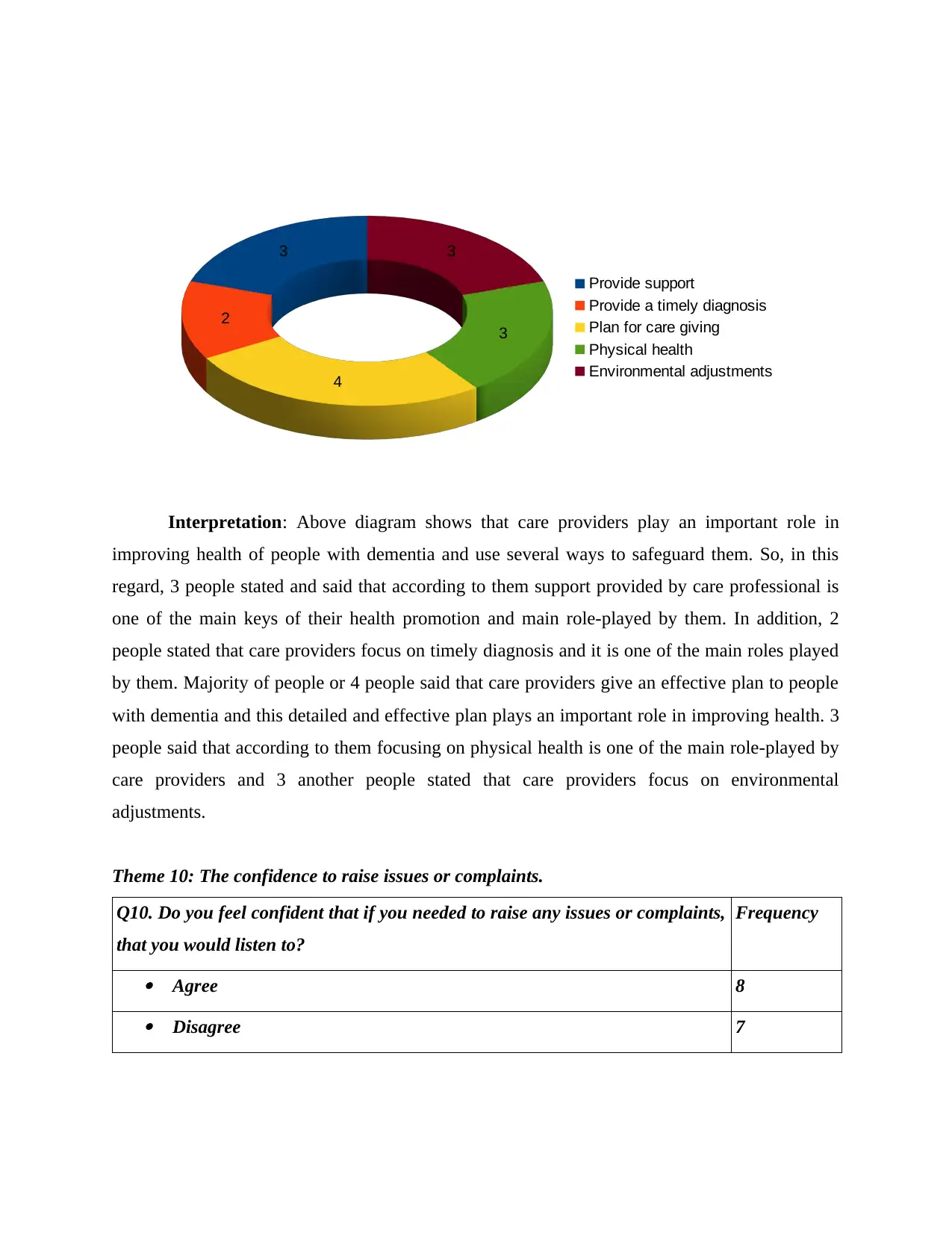
Interpretation: Above diagram shows that care providers play an important role in
improving health of people with dementia and use several ways to safeguard them. So, in this
regard, 3 people stated and said that according to them support provided by care professional is
one of the main keys of their health promotion and main role-played by them. In addition, 2
people stated that care providers focus on timely diagnosis and it is one of the main roles played
by them. Majority of people or 4 people said that care providers give an effective plan to people
with dementia and this detailed and effective plan plays an important role in improving health. 3
people said that according to them focusing on physical health is one of the main role-played by
care providers and 3 another people stated that care providers focus on environmental
adjustments.
Theme 10: The confidence to raise issues or complaints.
Q10. Do you feel confident that if you needed to raise any issues or complaints,
that you would listen to?
Frequency
Agree 8 Disagree 7
3
2
4
3
3
Provide support
Provide a timely diagnosis
Plan for care giving
Physical health
Environmental adjustments
improving health of people with dementia and use several ways to safeguard them. So, in this
regard, 3 people stated and said that according to them support provided by care professional is
one of the main keys of their health promotion and main role-played by them. In addition, 2
people stated that care providers focus on timely diagnosis and it is one of the main roles played
by them. Majority of people or 4 people said that care providers give an effective plan to people
with dementia and this detailed and effective plan plays an important role in improving health. 3
people said that according to them focusing on physical health is one of the main role-played by
care providers and 3 another people stated that care providers focus on environmental
adjustments.
Theme 10: The confidence to raise issues or complaints.
Q10. Do you feel confident that if you needed to raise any issues or complaints,
that you would listen to?
Frequency
Agree 8 Disagree 7
3
2
4
3
3
Provide support
Provide a timely diagnosis
Plan for care giving
Physical health
Environmental adjustments
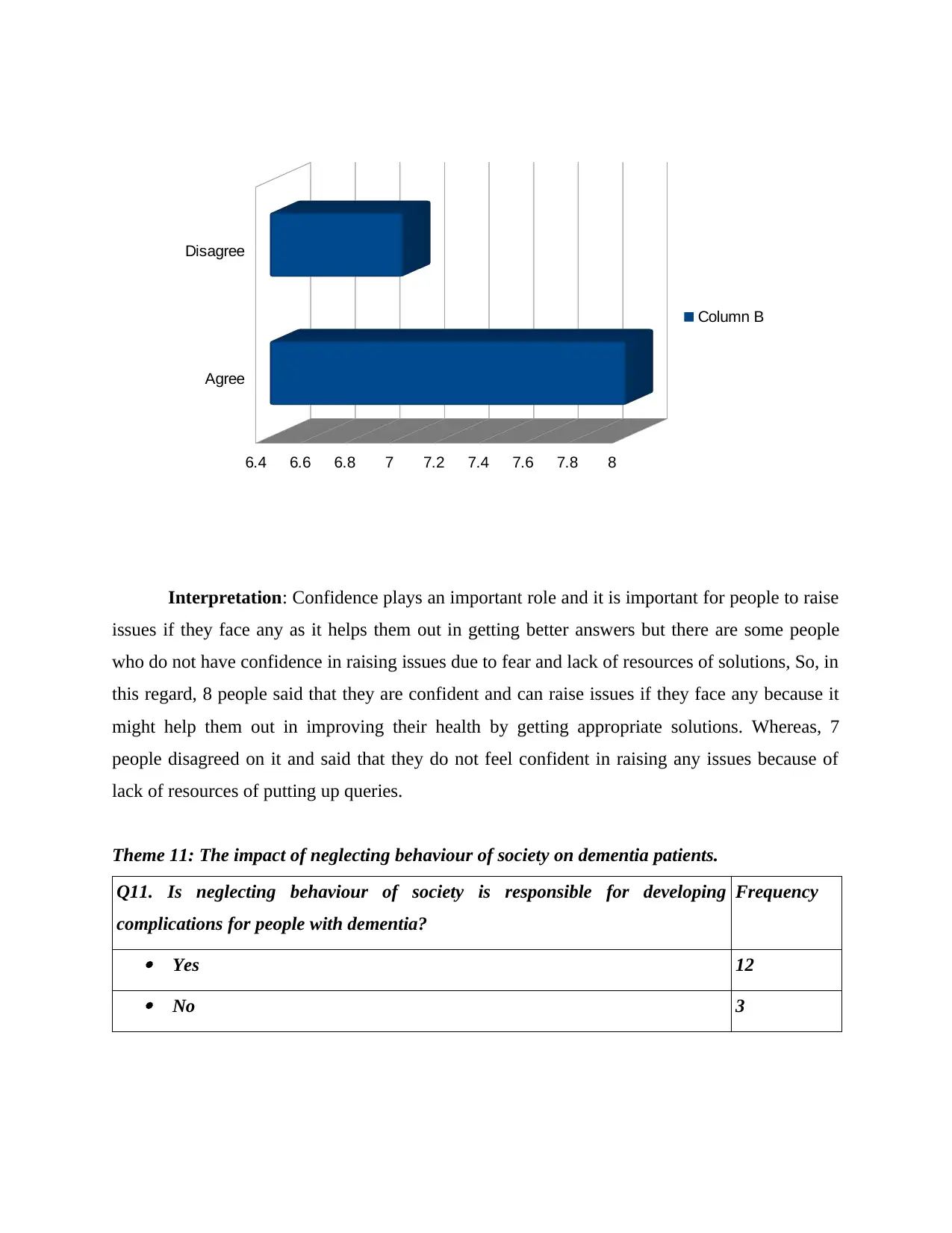
Interpretation: Confidence plays an important role and it is important for people to raise
issues if they face any as it helps them out in getting better answers but there are some people
who do not have confidence in raising issues due to fear and lack of resources of solutions, So, in
this regard, 8 people said that they are confident and can raise issues if they face any because it
might help them out in improving their health by getting appropriate solutions. Whereas, 7
people disagreed on it and said that they do not feel confident in raising any issues because of
lack of resources of putting up queries.
Theme 11: The impact of neglecting behaviour of society on dementia patients.
Q11. Is neglecting behaviour of society is responsible for developing
complications for people with dementia?
Frequency
Yes 12 No 3
Agree
Disagree
6.4 6.6 6.8 7 7.2 7.4 7.6 7.8 8
Column B
issues if they face any as it helps them out in getting better answers but there are some people
who do not have confidence in raising issues due to fear and lack of resources of solutions, So, in
this regard, 8 people said that they are confident and can raise issues if they face any because it
might help them out in improving their health by getting appropriate solutions. Whereas, 7
people disagreed on it and said that they do not feel confident in raising any issues because of
lack of resources of putting up queries.
Theme 11: The impact of neglecting behaviour of society on dementia patients.
Q11. Is neglecting behaviour of society is responsible for developing
complications for people with dementia?
Frequency
Yes 12 No 3
Agree
Disagree
6.4 6.6 6.8 7 7.2 7.4 7.6 7.8 8
Column B
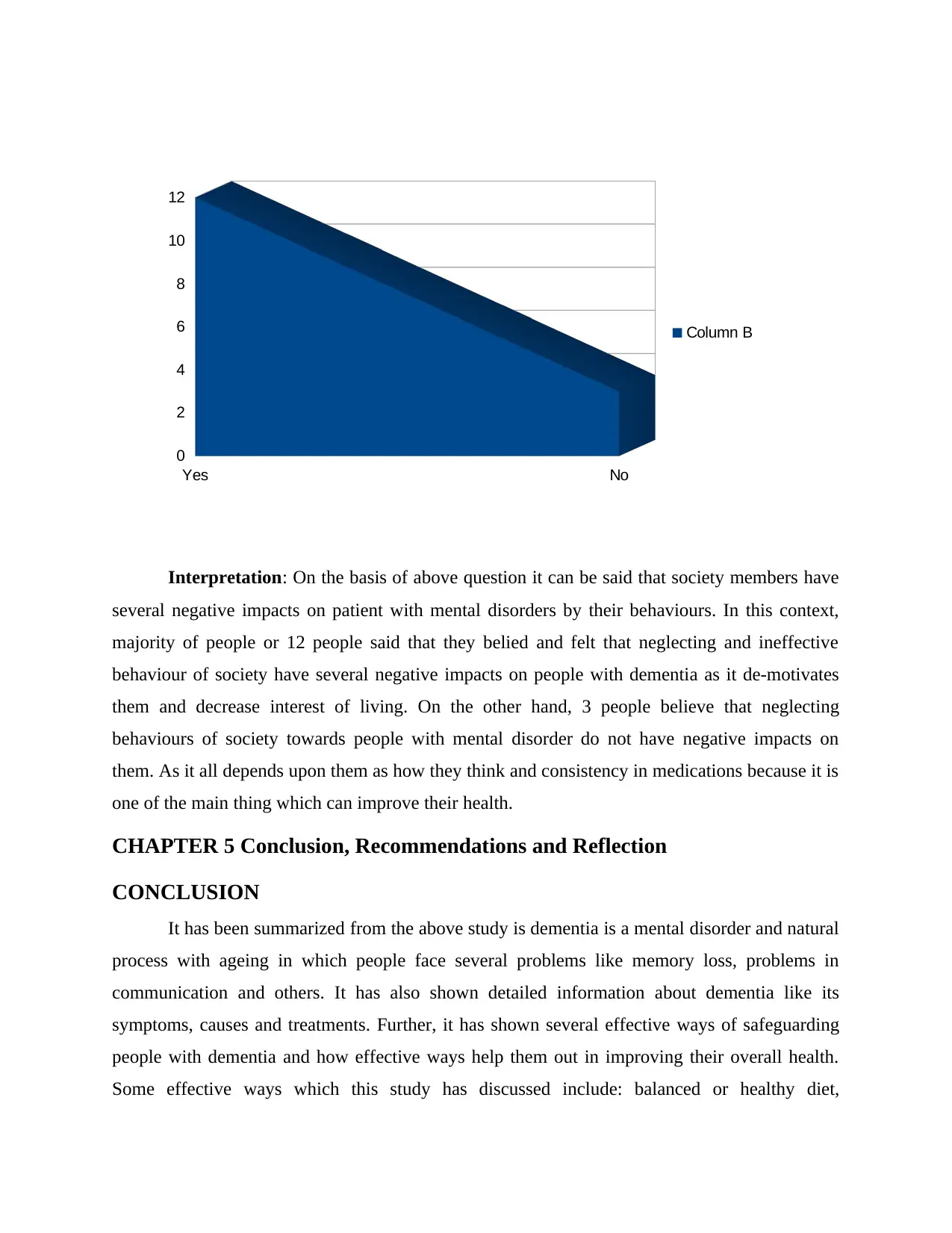
Interpretation: On the basis of above question it can be said that society members have
several negative impacts on patient with mental disorders by their behaviours. In this context,
majority of people or 12 people said that they belied and felt that neglecting and ineffective
behaviour of society have several negative impacts on people with dementia as it de-motivates
them and decrease interest of living. On the other hand, 3 people believe that neglecting
behaviours of society towards people with mental disorder do not have negative impacts on
them. As it all depends upon them as how they think and consistency in medications because it is
one of the main thing which can improve their health.
CHAPTER 5 Conclusion, Recommendations and Reflection
CONCLUSION
It has been summarized from the above study is dementia is a mental disorder and natural
process with ageing in which people face several problems like memory loss, problems in
communication and others. It has also shown detailed information about dementia like its
symptoms, causes and treatments. Further, it has shown several effective ways of safeguarding
people with dementia and how effective ways help them out in improving their overall health.
Some effective ways which this study has discussed include: balanced or healthy diet,
Yes No
0
2
4
6
8
10
12
Column B
several negative impacts on patient with mental disorders by their behaviours. In this context,
majority of people or 12 people said that they belied and felt that neglecting and ineffective
behaviour of society have several negative impacts on people with dementia as it de-motivates
them and decrease interest of living. On the other hand, 3 people believe that neglecting
behaviours of society towards people with mental disorder do not have negative impacts on
them. As it all depends upon them as how they think and consistency in medications because it is
one of the main thing which can improve their health.
CHAPTER 5 Conclusion, Recommendations and Reflection
CONCLUSION
It has been summarized from the above study is dementia is a mental disorder and natural
process with ageing in which people face several problems like memory loss, problems in
communication and others. It has also shown detailed information about dementia like its
symptoms, causes and treatments. Further, it has shown several effective ways of safeguarding
people with dementia and how effective ways help them out in improving their overall health.
Some effective ways which this study has discussed include: balanced or healthy diet,
Yes No
0
2
4
6
8
10
12
Column B
Secure Best Marks with AI Grader
Need help grading? Try our AI Grader for instant feedback on your assignments.
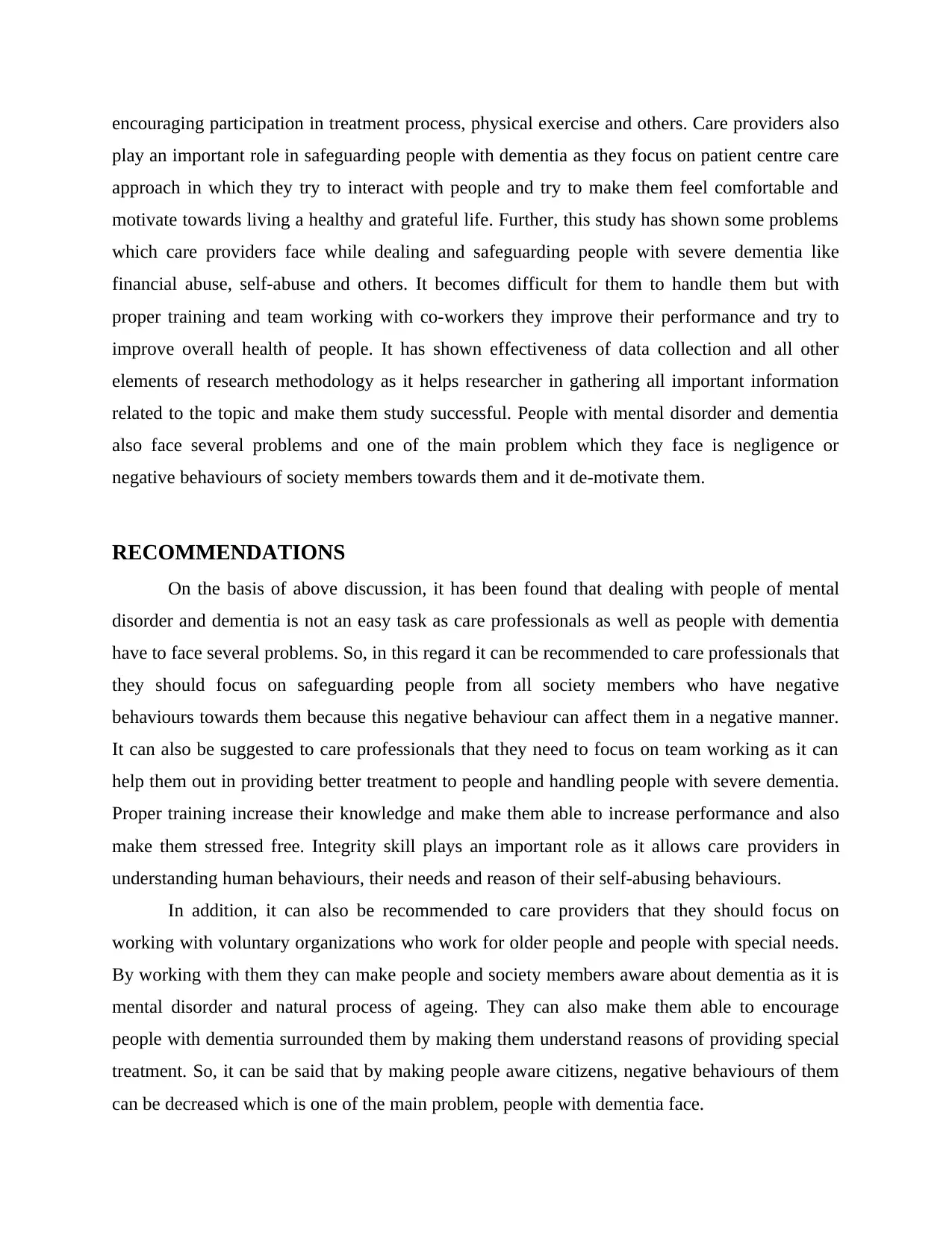
encouraging participation in treatment process, physical exercise and others. Care providers also
play an important role in safeguarding people with dementia as they focus on patient centre care
approach in which they try to interact with people and try to make them feel comfortable and
motivate towards living a healthy and grateful life. Further, this study has shown some problems
which care providers face while dealing and safeguarding people with severe dementia like
financial abuse, self-abuse and others. It becomes difficult for them to handle them but with
proper training and team working with co-workers they improve their performance and try to
improve overall health of people. It has shown effectiveness of data collection and all other
elements of research methodology as it helps researcher in gathering all important information
related to the topic and make them study successful. People with mental disorder and dementia
also face several problems and one of the main problem which they face is negligence or
negative behaviours of society members towards them and it de-motivate them.
RECOMMENDATIONS
On the basis of above discussion, it has been found that dealing with people of mental
disorder and dementia is not an easy task as care professionals as well as people with dementia
have to face several problems. So, in this regard it can be recommended to care professionals that
they should focus on safeguarding people from all society members who have negative
behaviours towards them because this negative behaviour can affect them in a negative manner.
It can also be suggested to care professionals that they need to focus on team working as it can
help them out in providing better treatment to people and handling people with severe dementia.
Proper training increase their knowledge and make them able to increase performance and also
make them stressed free. Integrity skill plays an important role as it allows care providers in
understanding human behaviours, their needs and reason of their self-abusing behaviours.
In addition, it can also be recommended to care providers that they should focus on
working with voluntary organizations who work for older people and people with special needs.
By working with them they can make people and society members aware about dementia as it is
mental disorder and natural process of ageing. They can also make them able to encourage
people with dementia surrounded them by making them understand reasons of providing special
treatment. So, it can be said that by making people aware citizens, negative behaviours of them
can be decreased which is one of the main problem, people with dementia face.
play an important role in safeguarding people with dementia as they focus on patient centre care
approach in which they try to interact with people and try to make them feel comfortable and
motivate towards living a healthy and grateful life. Further, this study has shown some problems
which care providers face while dealing and safeguarding people with severe dementia like
financial abuse, self-abuse and others. It becomes difficult for them to handle them but with
proper training and team working with co-workers they improve their performance and try to
improve overall health of people. It has shown effectiveness of data collection and all other
elements of research methodology as it helps researcher in gathering all important information
related to the topic and make them study successful. People with mental disorder and dementia
also face several problems and one of the main problem which they face is negligence or
negative behaviours of society members towards them and it de-motivate them.
RECOMMENDATIONS
On the basis of above discussion, it has been found that dealing with people of mental
disorder and dementia is not an easy task as care professionals as well as people with dementia
have to face several problems. So, in this regard it can be recommended to care professionals that
they should focus on safeguarding people from all society members who have negative
behaviours towards them because this negative behaviour can affect them in a negative manner.
It can also be suggested to care professionals that they need to focus on team working as it can
help them out in providing better treatment to people and handling people with severe dementia.
Proper training increase their knowledge and make them able to increase performance and also
make them stressed free. Integrity skill plays an important role as it allows care providers in
understanding human behaviours, their needs and reason of their self-abusing behaviours.
In addition, it can also be recommended to care providers that they should focus on
working with voluntary organizations who work for older people and people with special needs.
By working with them they can make people and society members aware about dementia as it is
mental disorder and natural process of ageing. They can also make them able to encourage
people with dementia surrounded them by making them understand reasons of providing special
treatment. So, it can be said that by making people aware citizens, negative behaviours of them
can be decreased which is one of the main problem, people with dementia face.
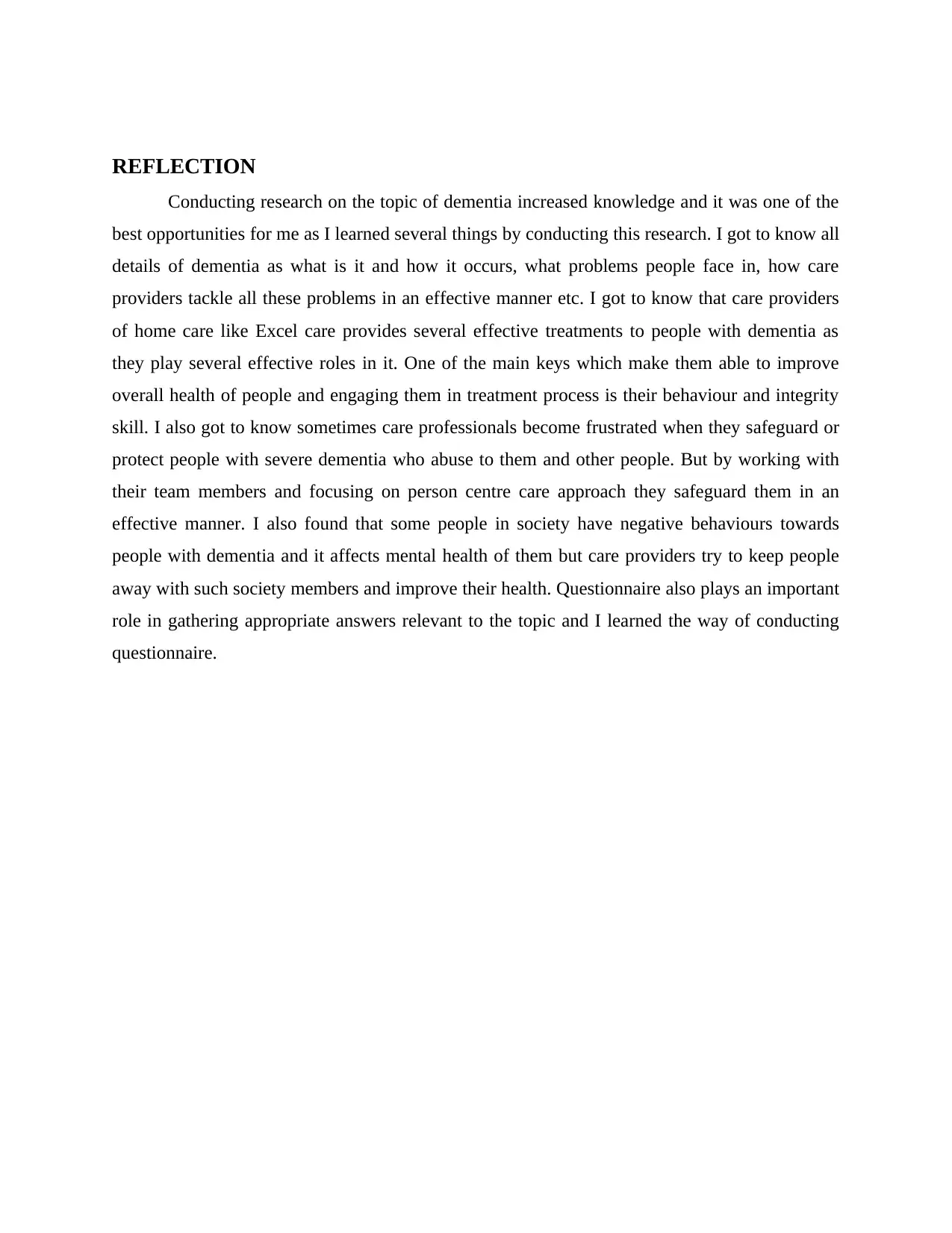
REFLECTION
Conducting research on the topic of dementia increased knowledge and it was one of the
best opportunities for me as I learned several things by conducting this research. I got to know all
details of dementia as what is it and how it occurs, what problems people face in, how care
providers tackle all these problems in an effective manner etc. I got to know that care providers
of home care like Excel care provides several effective treatments to people with dementia as
they play several effective roles in it. One of the main keys which make them able to improve
overall health of people and engaging them in treatment process is their behaviour and integrity
skill. I also got to know sometimes care professionals become frustrated when they safeguard or
protect people with severe dementia who abuse to them and other people. But by working with
their team members and focusing on person centre care approach they safeguard them in an
effective manner. I also found that some people in society have negative behaviours towards
people with dementia and it affects mental health of them but care providers try to keep people
away with such society members and improve their health. Questionnaire also plays an important
role in gathering appropriate answers relevant to the topic and I learned the way of conducting
questionnaire.
Conducting research on the topic of dementia increased knowledge and it was one of the
best opportunities for me as I learned several things by conducting this research. I got to know all
details of dementia as what is it and how it occurs, what problems people face in, how care
providers tackle all these problems in an effective manner etc. I got to know that care providers
of home care like Excel care provides several effective treatments to people with dementia as
they play several effective roles in it. One of the main keys which make them able to improve
overall health of people and engaging them in treatment process is their behaviour and integrity
skill. I also got to know sometimes care professionals become frustrated when they safeguard or
protect people with severe dementia who abuse to them and other people. But by working with
their team members and focusing on person centre care approach they safeguard them in an
effective manner. I also found that some people in society have negative behaviours towards
people with dementia and it affects mental health of them but care providers try to keep people
away with such society members and improve their health. Questionnaire also plays an important
role in gathering appropriate answers relevant to the topic and I learned the way of conducting
questionnaire.
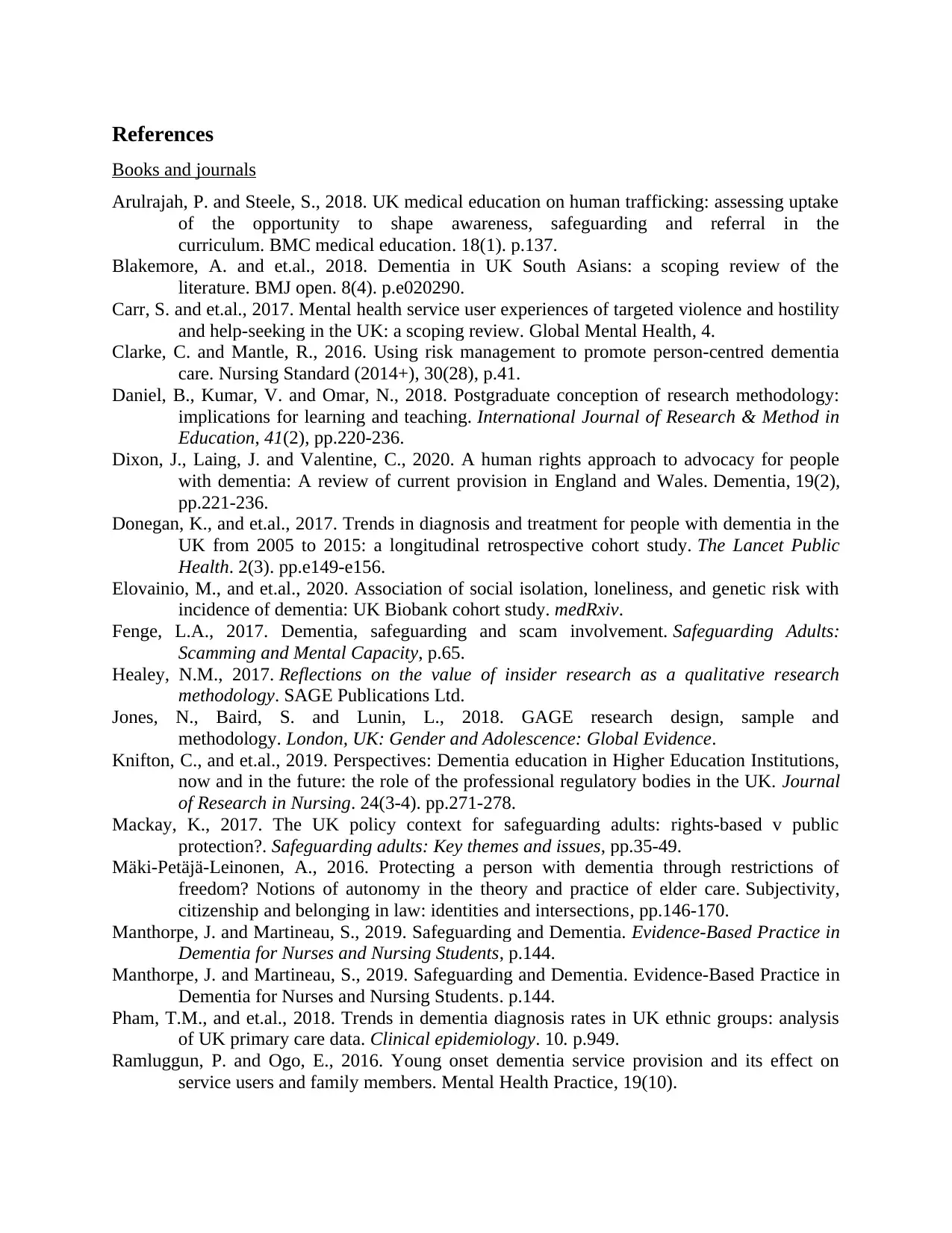
References
Books and journals
Arulrajah, P. and Steele, S., 2018. UK medical education on human trafficking: assessing uptake
of the opportunity to shape awareness, safeguarding and referral in the
curriculum. BMC medical education. 18(1). p.137.
Blakemore, A. and et.al., 2018. Dementia in UK South Asians: a scoping review of the
literature. BMJ open. 8(4). p.e020290.
Carr, S. and et.al., 2017. Mental health service user experiences of targeted violence and hostility
and help-seeking in the UK: a scoping review. Global Mental Health, 4.
Clarke, C. and Mantle, R., 2016. Using risk management to promote person-centred dementia
care. Nursing Standard (2014+), 30(28), p.41.
Daniel, B., Kumar, V. and Omar, N., 2018. Postgraduate conception of research methodology:
implications for learning and teaching. International Journal of Research & Method in
Education, 41(2), pp.220-236.
Dixon, J., Laing, J. and Valentine, C., 2020. A human rights approach to advocacy for people
with dementia: A review of current provision in England and Wales. Dementia, 19(2),
pp.221-236.
Donegan, K., and et.al., 2017. Trends in diagnosis and treatment for people with dementia in the
UK from 2005 to 2015: a longitudinal retrospective cohort study. The Lancet Public
Health. 2(3). pp.e149-e156.
Elovainio, M., and et.al., 2020. Association of social isolation, loneliness, and genetic risk with
incidence of dementia: UK Biobank cohort study. medRxiv.
Fenge, L.A., 2017. Dementia, safeguarding and scam involvement. Safeguarding Adults:
Scamming and Mental Capacity, p.65.
Healey, N.M., 2017. Reflections on the value of insider research as a qualitative research
methodology. SAGE Publications Ltd.
Jones, N., Baird, S. and Lunin, L., 2018. GAGE research design, sample and
methodology. London, UK: Gender and Adolescence: Global Evidence.
Knifton, C., and et.al., 2019. Perspectives: Dementia education in Higher Education Institutions,
now and in the future: the role of the professional regulatory bodies in the UK. Journal
of Research in Nursing. 24(3-4). pp.271-278.
Mackay, K., 2017. The UK policy context for safeguarding adults: rights-based v public
protection?. Safeguarding adults: Key themes and issues, pp.35-49.
Mäki-Petäjä-Leinonen, A., 2016. Protecting a person with dementia through restrictions of
freedom? Notions of autonomy in the theory and practice of elder care. Subjectivity,
citizenship and belonging in law: identities and intersections, pp.146-170.
Manthorpe, J. and Martineau, S., 2019. Safeguarding and Dementia. Evidence-Based Practice in
Dementia for Nurses and Nursing Students, p.144.
Manthorpe, J. and Martineau, S., 2019. Safeguarding and Dementia. Evidence-Based Practice in
Dementia for Nurses and Nursing Students. p.144.
Pham, T.M., and et.al., 2018. Trends in dementia diagnosis rates in UK ethnic groups: analysis
of UK primary care data. Clinical epidemiology. 10. p.949.
Ramluggun, P. and Ogo, E., 2016. Young onset dementia service provision and its effect on
service users and family members. Mental Health Practice, 19(10).
Books and journals
Arulrajah, P. and Steele, S., 2018. UK medical education on human trafficking: assessing uptake
of the opportunity to shape awareness, safeguarding and referral in the
curriculum. BMC medical education. 18(1). p.137.
Blakemore, A. and et.al., 2018. Dementia in UK South Asians: a scoping review of the
literature. BMJ open. 8(4). p.e020290.
Carr, S. and et.al., 2017. Mental health service user experiences of targeted violence and hostility
and help-seeking in the UK: a scoping review. Global Mental Health, 4.
Clarke, C. and Mantle, R., 2016. Using risk management to promote person-centred dementia
care. Nursing Standard (2014+), 30(28), p.41.
Daniel, B., Kumar, V. and Omar, N., 2018. Postgraduate conception of research methodology:
implications for learning and teaching. International Journal of Research & Method in
Education, 41(2), pp.220-236.
Dixon, J., Laing, J. and Valentine, C., 2020. A human rights approach to advocacy for people
with dementia: A review of current provision in England and Wales. Dementia, 19(2),
pp.221-236.
Donegan, K., and et.al., 2017. Trends in diagnosis and treatment for people with dementia in the
UK from 2005 to 2015: a longitudinal retrospective cohort study. The Lancet Public
Health. 2(3). pp.e149-e156.
Elovainio, M., and et.al., 2020. Association of social isolation, loneliness, and genetic risk with
incidence of dementia: UK Biobank cohort study. medRxiv.
Fenge, L.A., 2017. Dementia, safeguarding and scam involvement. Safeguarding Adults:
Scamming and Mental Capacity, p.65.
Healey, N.M., 2017. Reflections on the value of insider research as a qualitative research
methodology. SAGE Publications Ltd.
Jones, N., Baird, S. and Lunin, L., 2018. GAGE research design, sample and
methodology. London, UK: Gender and Adolescence: Global Evidence.
Knifton, C., and et.al., 2019. Perspectives: Dementia education in Higher Education Institutions,
now and in the future: the role of the professional regulatory bodies in the UK. Journal
of Research in Nursing. 24(3-4). pp.271-278.
Mackay, K., 2017. The UK policy context for safeguarding adults: rights-based v public
protection?. Safeguarding adults: Key themes and issues, pp.35-49.
Mäki-Petäjä-Leinonen, A., 2016. Protecting a person with dementia through restrictions of
freedom? Notions of autonomy in the theory and practice of elder care. Subjectivity,
citizenship and belonging in law: identities and intersections, pp.146-170.
Manthorpe, J. and Martineau, S., 2019. Safeguarding and Dementia. Evidence-Based Practice in
Dementia for Nurses and Nursing Students, p.144.
Manthorpe, J. and Martineau, S., 2019. Safeguarding and Dementia. Evidence-Based Practice in
Dementia for Nurses and Nursing Students. p.144.
Pham, T.M., and et.al., 2018. Trends in dementia diagnosis rates in UK ethnic groups: analysis
of UK primary care data. Clinical epidemiology. 10. p.949.
Ramluggun, P. and Ogo, E., 2016. Young onset dementia service provision and its effect on
service users and family members. Mental Health Practice, 19(10).
Paraphrase This Document
Need a fresh take? Get an instant paraphrase of this document with our AI Paraphraser
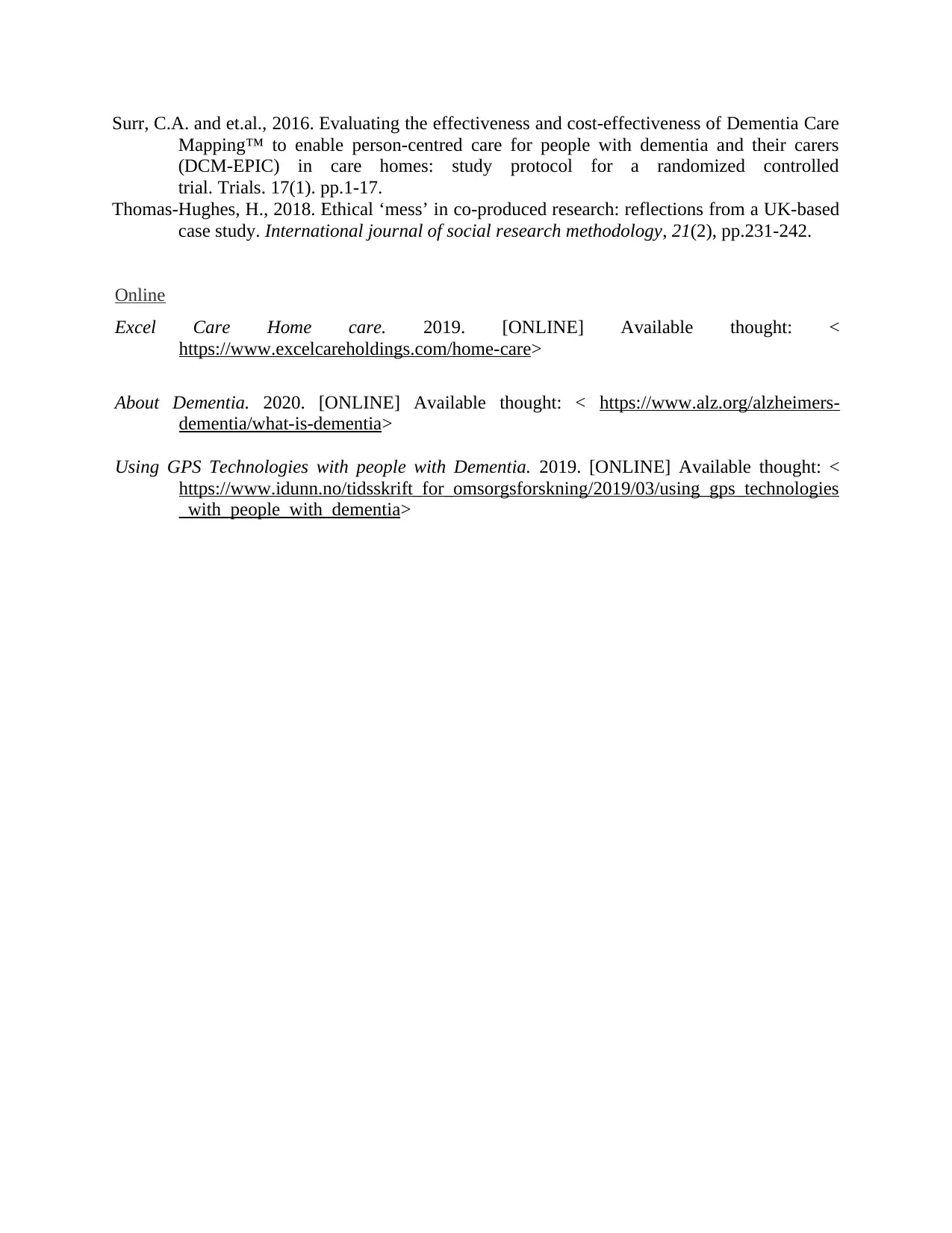
Surr, C.A. and et.al., 2016. Evaluating the effectiveness and cost-effectiveness of Dementia Care
Mapping™ to enable person-centred care for people with dementia and their carers
(DCM-EPIC) in care homes: study protocol for a randomized controlled
trial. Trials. 17(1). pp.1-17.
Thomas-Hughes, H., 2018. Ethical ‘mess’ in co-produced research: reflections from a UK-based
case study. International journal of social research methodology, 21(2), pp.231-242.
Online
Excel Care Home care. 2019. [ONLINE] Available thought: <
https://www.excelcareholdings.com/home-care>
About Dementia. 2020. [ONLINE] Available thought: < https://www.alz.org/alzheimers-
dementia/what-is-dementia>
Using GPS Technologies with people with Dementia. 2019. [ONLINE] Available thought: <
https://www.idunn.no/tidsskrift_for_omsorgsforskning/2019/03/using_gps_technologies
_with_people_with_dementia>
Mapping™ to enable person-centred care for people with dementia and their carers
(DCM-EPIC) in care homes: study protocol for a randomized controlled
trial. Trials. 17(1). pp.1-17.
Thomas-Hughes, H., 2018. Ethical ‘mess’ in co-produced research: reflections from a UK-based
case study. International journal of social research methodology, 21(2), pp.231-242.
Online
Excel Care Home care. 2019. [ONLINE] Available thought: <
https://www.excelcareholdings.com/home-care>
About Dementia. 2020. [ONLINE] Available thought: < https://www.alz.org/alzheimers-
dementia/what-is-dementia>
Using GPS Technologies with people with Dementia. 2019. [ONLINE] Available thought: <
https://www.idunn.no/tidsskrift_for_omsorgsforskning/2019/03/using_gps_technologies
_with_people_with_dementia>
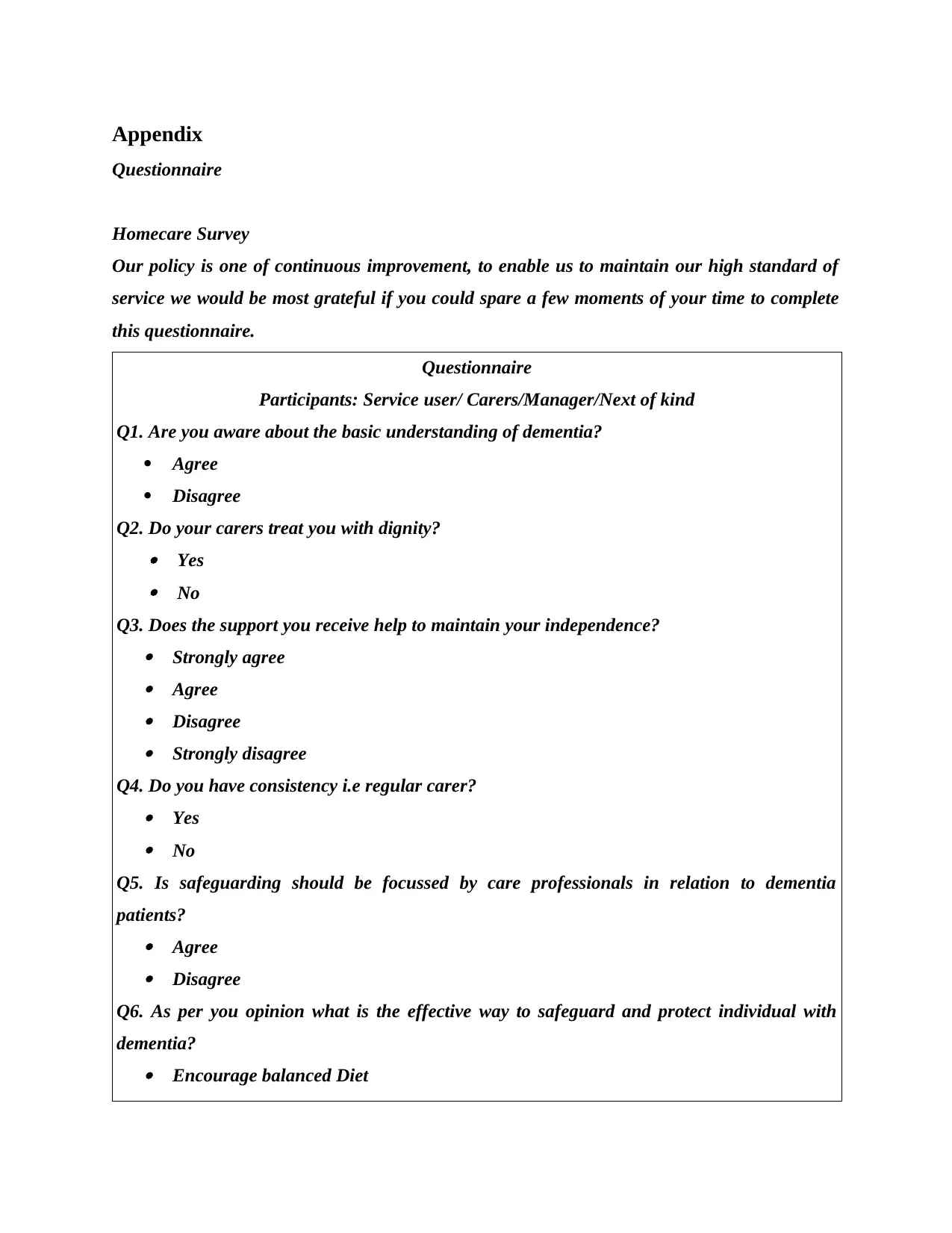
Appendix
Questionnaire
Homecare Survey
Our policy is one of continuous improvement, to enable us to maintain our high standard of
service we would be most grateful if you could spare a few moments of your time to complete
this questionnaire.
Questionnaire
Participants: Service user/ Carers/Manager/Next of kind
Q1. Are you aware about the basic understanding of dementia?
Agree
Disagree
Q2. Do your carers treat you with dignity? Yes No
Q3. Does the support you receive help to maintain your independence? Strongly agree Agree Disagree Strongly disagree
Q4. Do you have consistency i.e regular carer? Yes No
Q5. Is safeguarding should be focussed by care professionals in relation to dementia
patients? Agree Disagree
Q6. As per you opinion what is the effective way to safeguard and protect individual with
dementia? Encourage balanced Diet
Questionnaire
Homecare Survey
Our policy is one of continuous improvement, to enable us to maintain our high standard of
service we would be most grateful if you could spare a few moments of your time to complete
this questionnaire.
Questionnaire
Participants: Service user/ Carers/Manager/Next of kind
Q1. Are you aware about the basic understanding of dementia?
Agree
Disagree
Q2. Do your carers treat you with dignity? Yes No
Q3. Does the support you receive help to maintain your independence? Strongly agree Agree Disagree Strongly disagree
Q4. Do you have consistency i.e regular carer? Yes No
Q5. Is safeguarding should be focussed by care professionals in relation to dementia
patients? Agree Disagree
Q6. As per you opinion what is the effective way to safeguard and protect individual with
dementia? Encourage balanced Diet
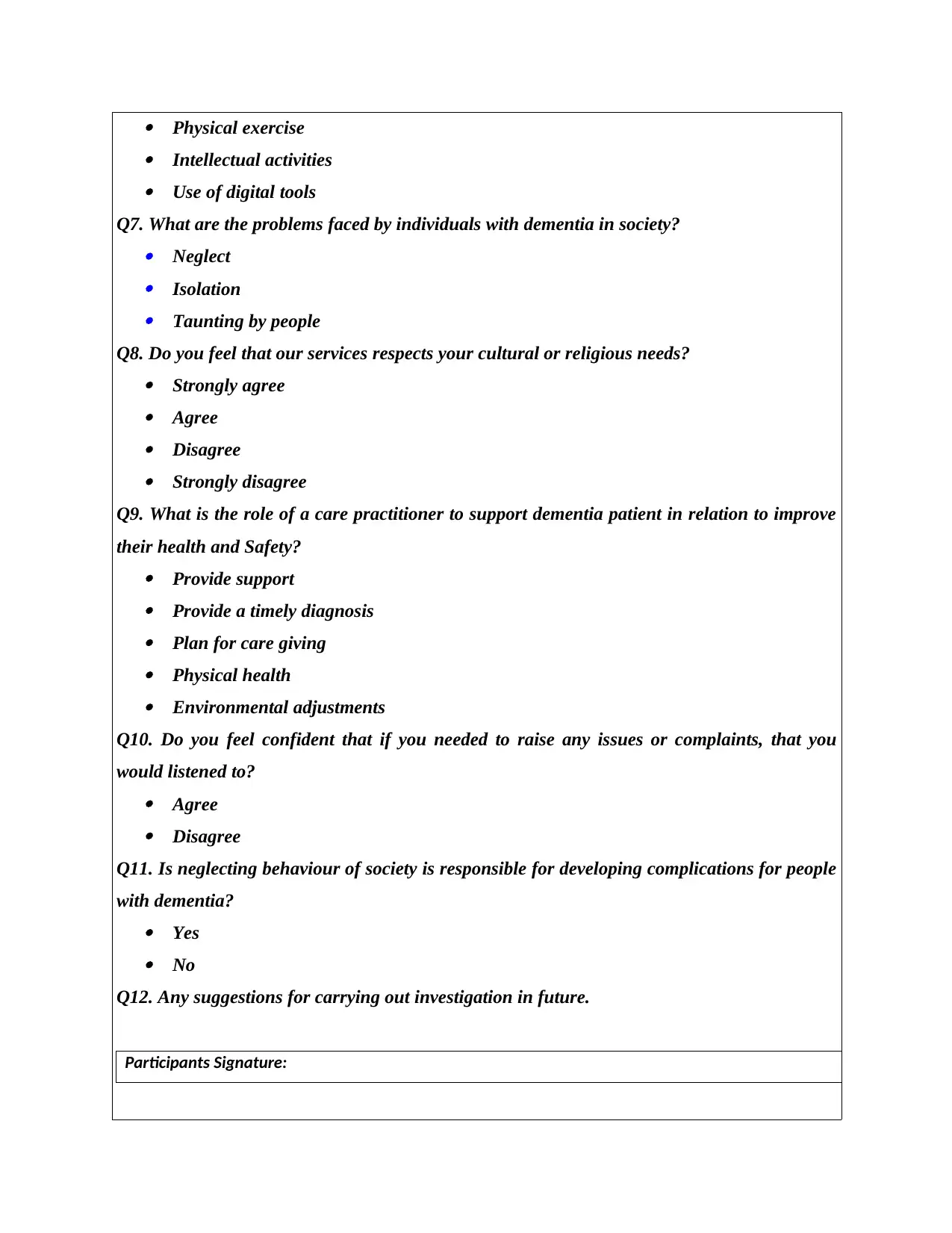
Physical exercise Intellectual activities Use of digital tools
Q7. What are the problems faced by individuals with dementia in society? Neglect Isolation Taunting by people
Q8. Do you feel that our services respects your cultural or religious needs? Strongly agree Agree Disagree Strongly disagree
Q9. What is the role of a care practitioner to support dementia patient in relation to improve
their health and Safety? Provide support Provide a timely diagnosis Plan for care giving Physical health Environmental adjustments
Q10. Do you feel confident that if you needed to raise any issues or complaints, that you
would listened to? Agree Disagree
Q11. Is neglecting behaviour of society is responsible for developing complications for people
with dementia? Yes No
Q12. Any suggestions for carrying out investigation in future.
Participants Signature:
Q7. What are the problems faced by individuals with dementia in society? Neglect Isolation Taunting by people
Q8. Do you feel that our services respects your cultural or religious needs? Strongly agree Agree Disagree Strongly disagree
Q9. What is the role of a care practitioner to support dementia patient in relation to improve
their health and Safety? Provide support Provide a timely diagnosis Plan for care giving Physical health Environmental adjustments
Q10. Do you feel confident that if you needed to raise any issues or complaints, that you
would listened to? Agree Disagree
Q11. Is neglecting behaviour of society is responsible for developing complications for people
with dementia? Yes No
Q12. Any suggestions for carrying out investigation in future.
Participants Signature:
Secure Best Marks with AI Grader
Need help grading? Try our AI Grader for instant feedback on your assignments.

Survey results are used to help us measure the care and service quality; your feedback is
important to us as it helps us to promote quality and to look at improvements needed, which
in turn provide better outcomes for the people using our service. The results will be collated,
and any comments will be added to our Compliance System which enables us to regulate and
monitor our services. Thank you for taking the time to complete our survey.
important to us as it helps us to promote quality and to look at improvements needed, which
in turn provide better outcomes for the people using our service. The results will be collated,
and any comments will be added to our Compliance System which enables us to regulate and
monitor our services. Thank you for taking the time to complete our survey.
1 out of 35
Related Documents
Your All-in-One AI-Powered Toolkit for Academic Success.
+13062052269
info@desklib.com
Available 24*7 on WhatsApp / Email
![[object Object]](/_next/static/media/star-bottom.7253800d.svg)
Unlock your academic potential
© 2024 | Zucol Services PVT LTD | All rights reserved.





